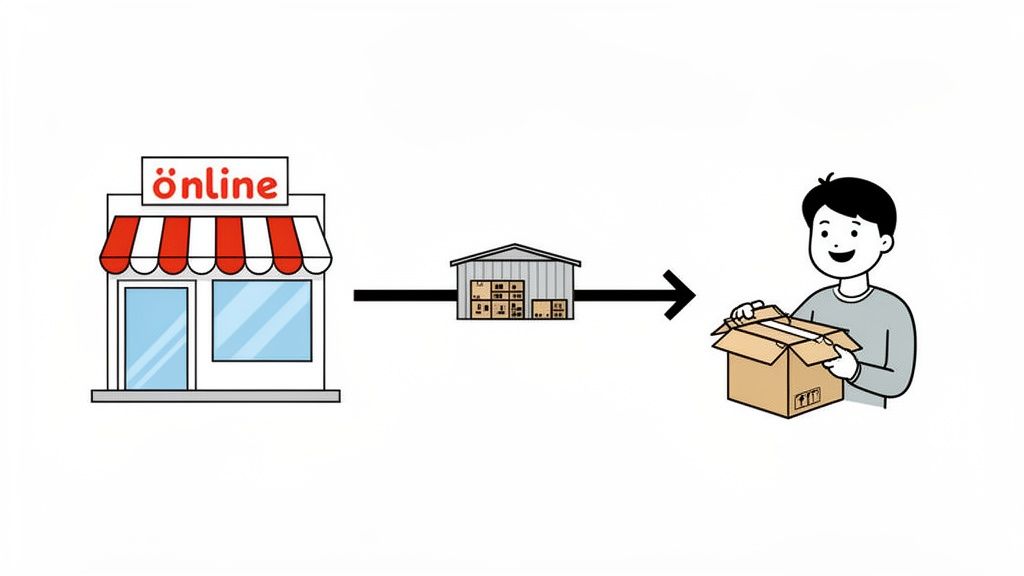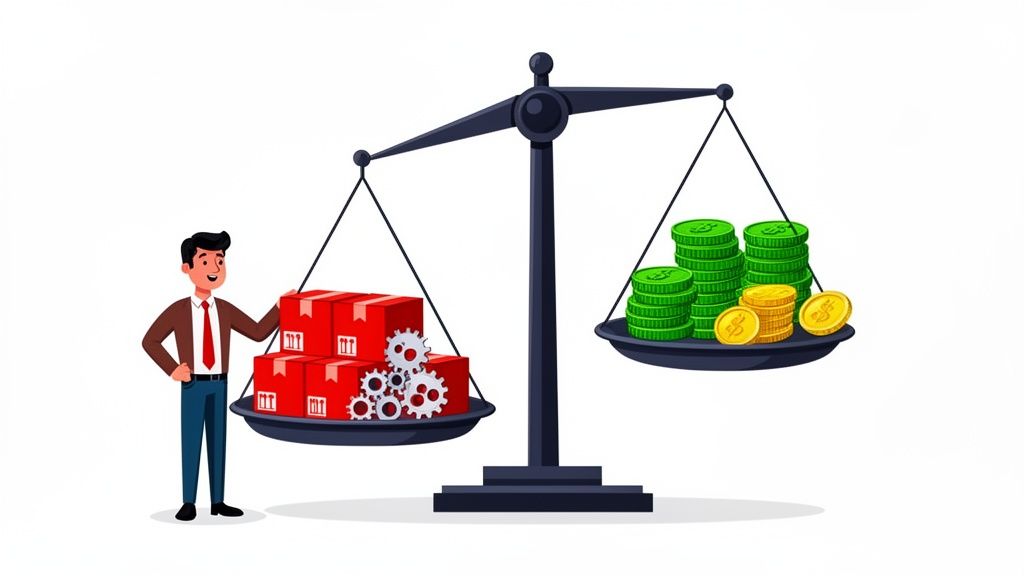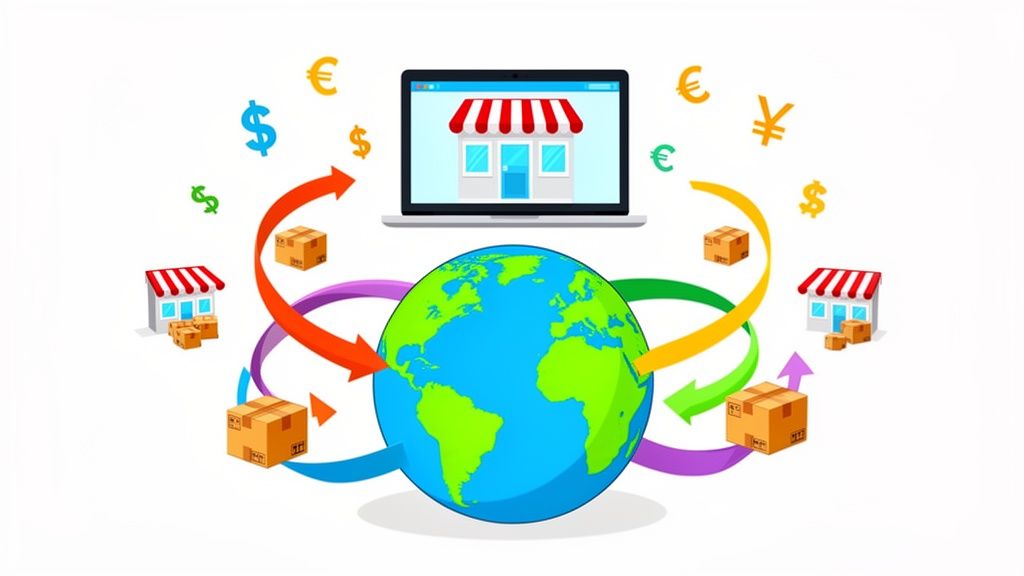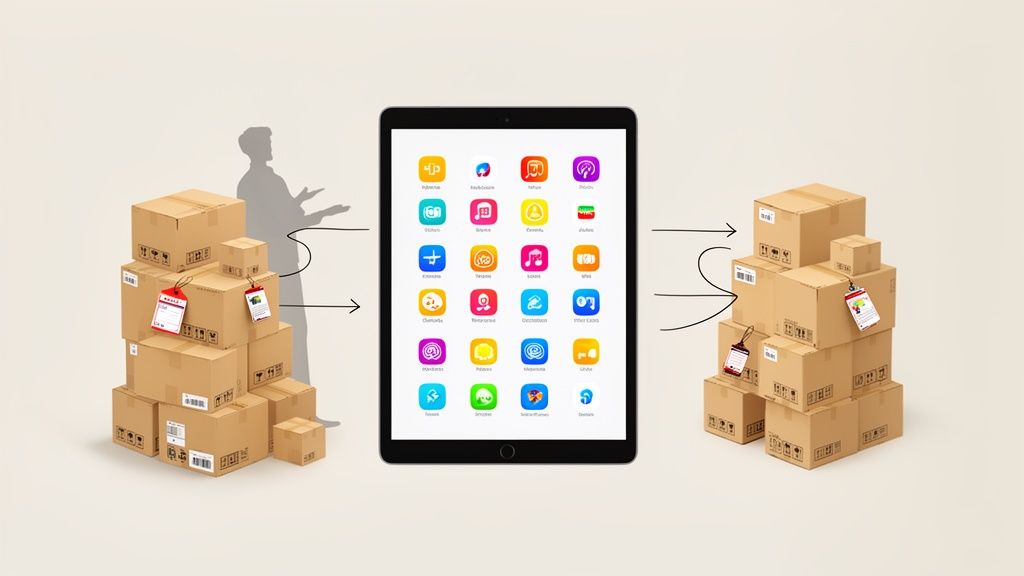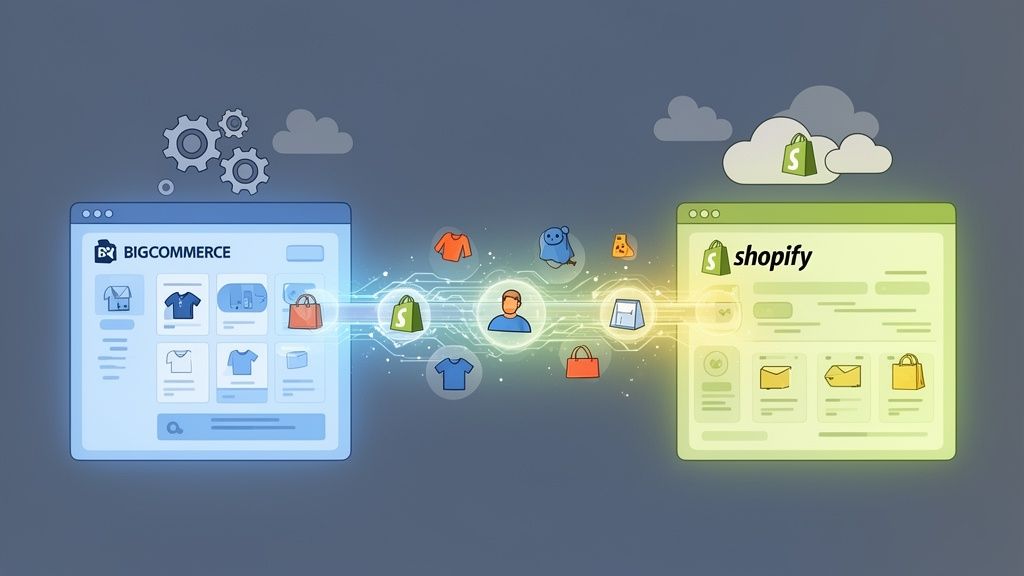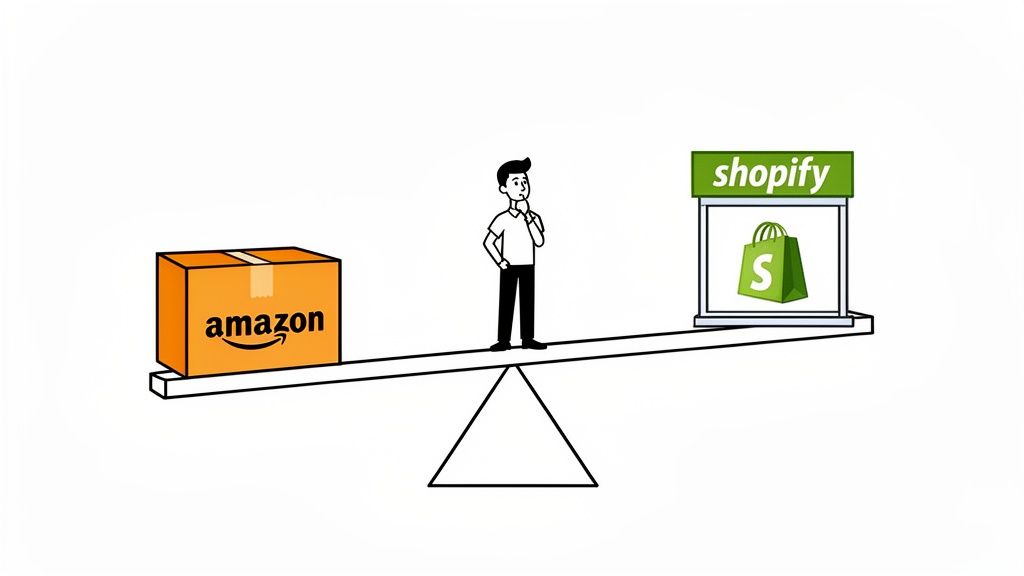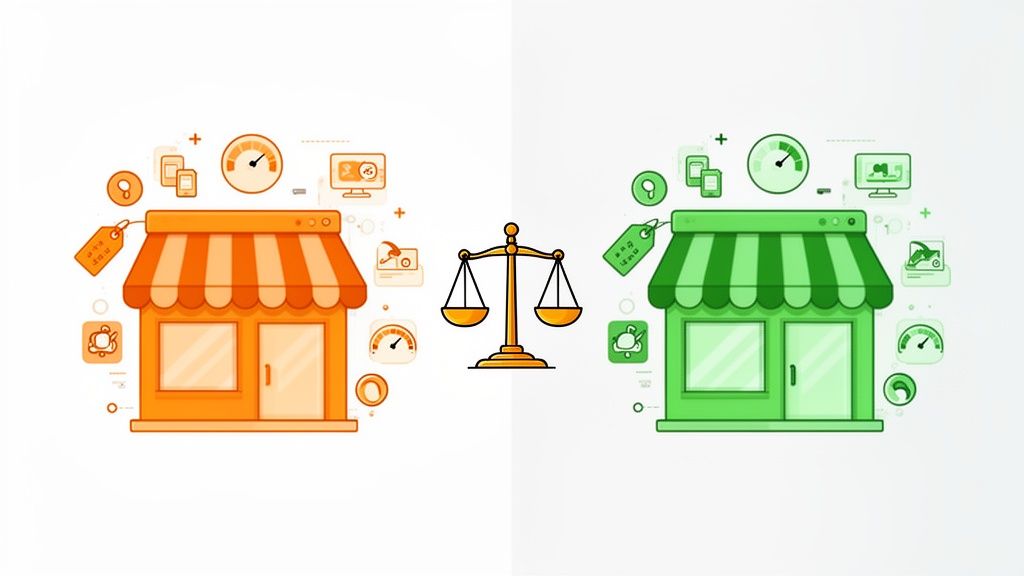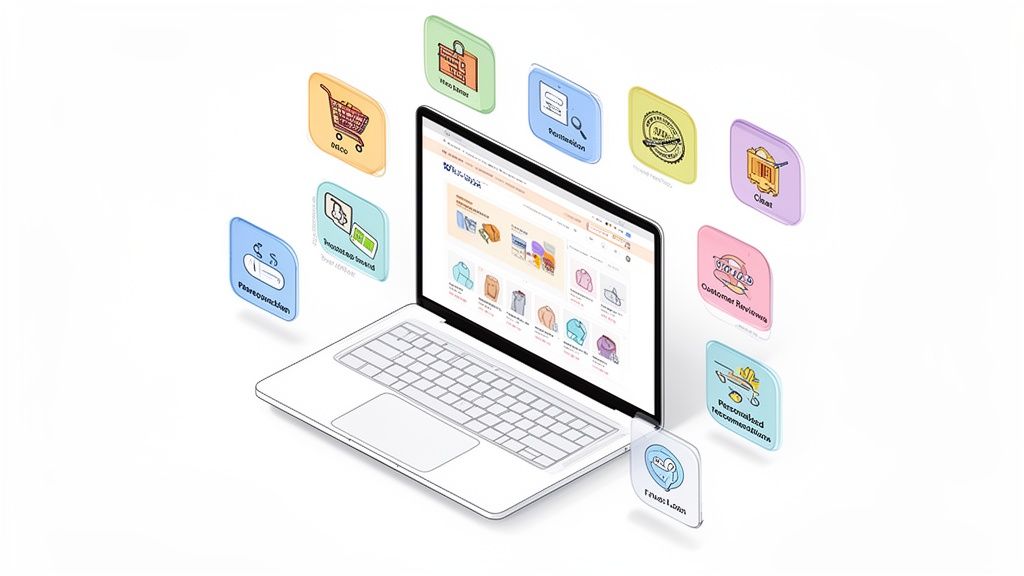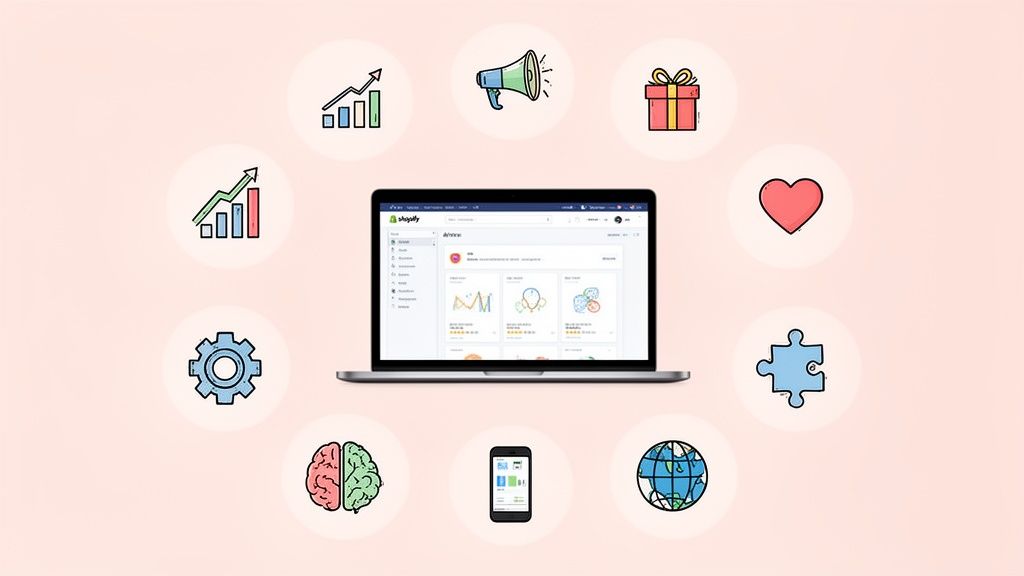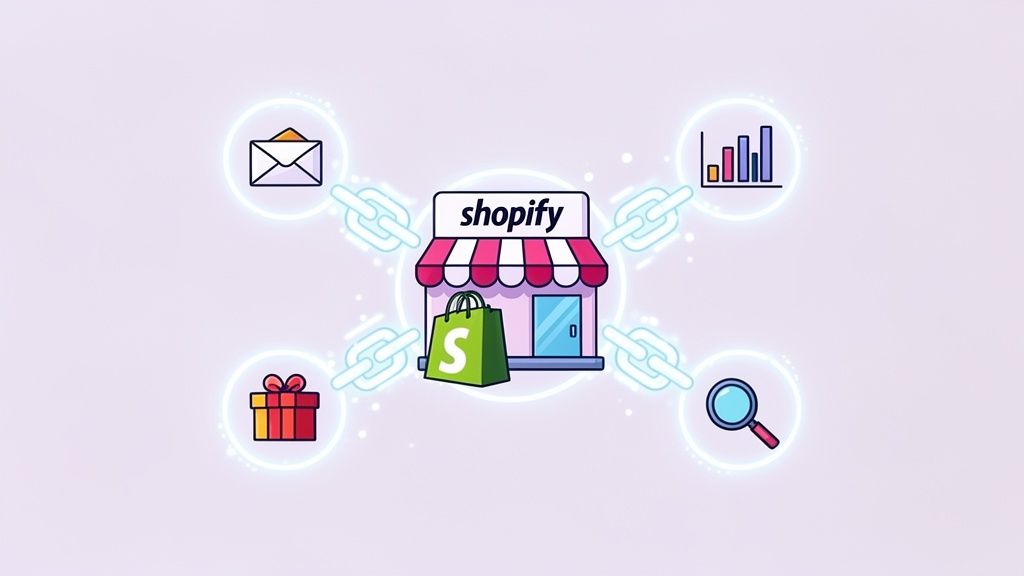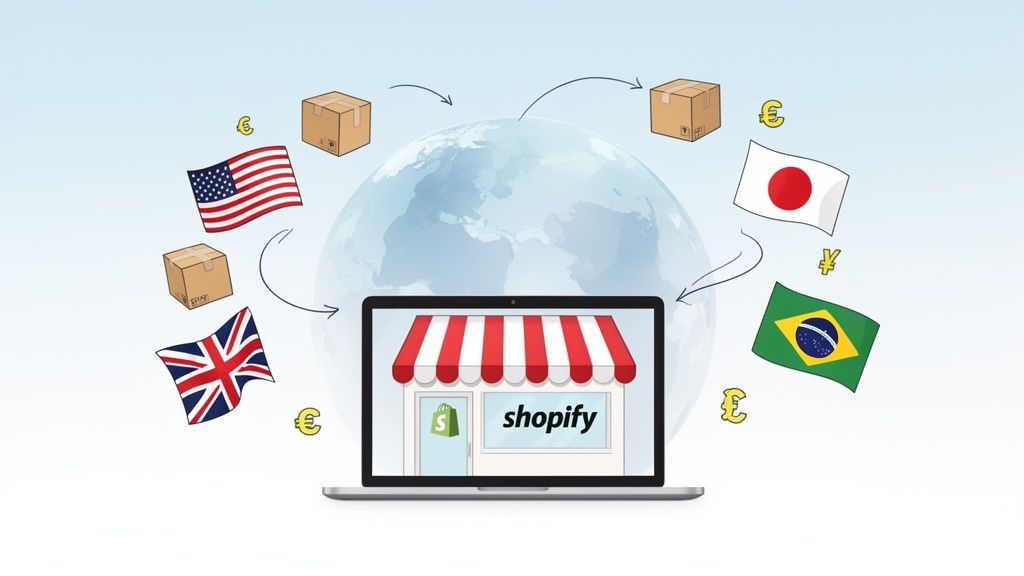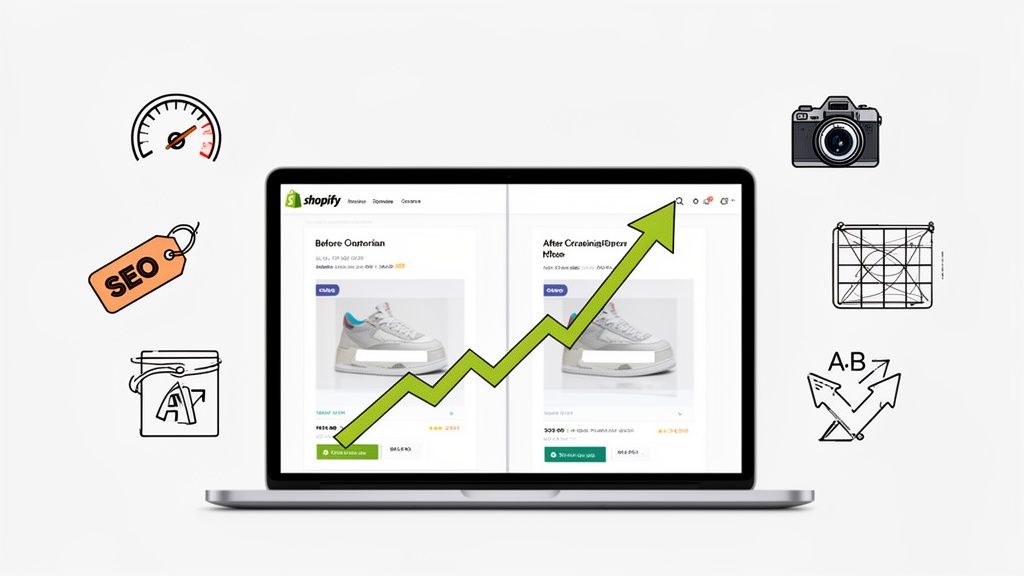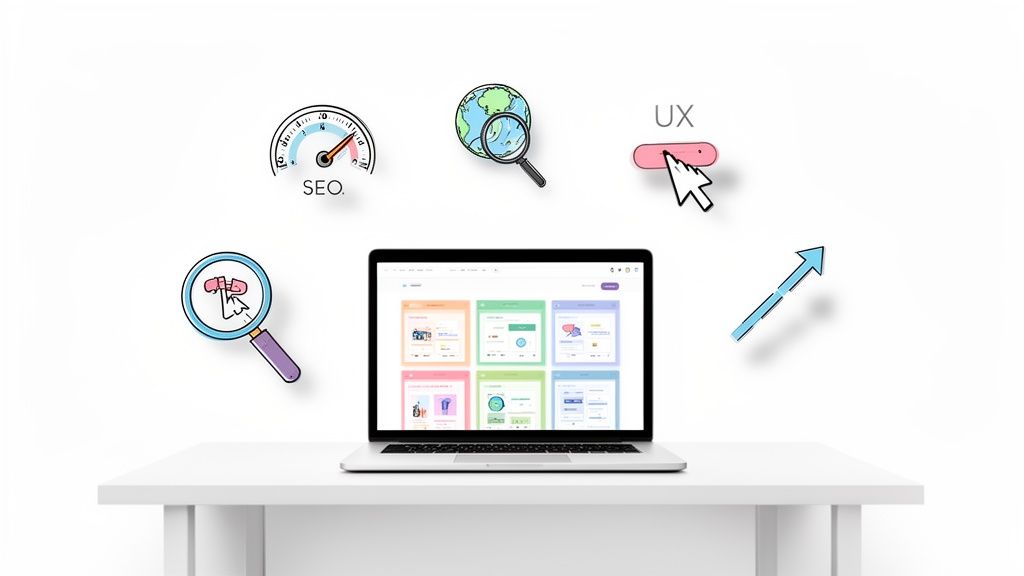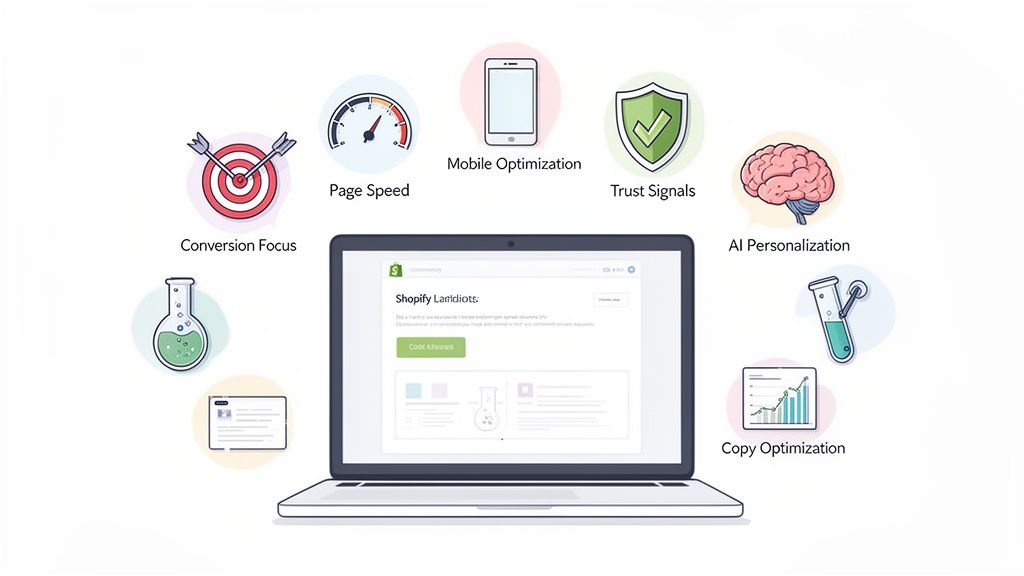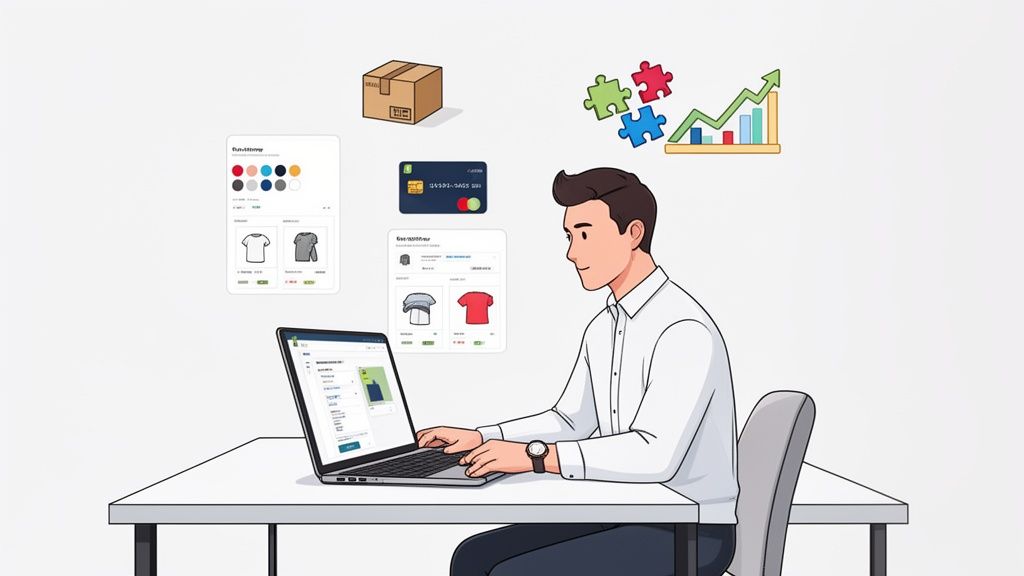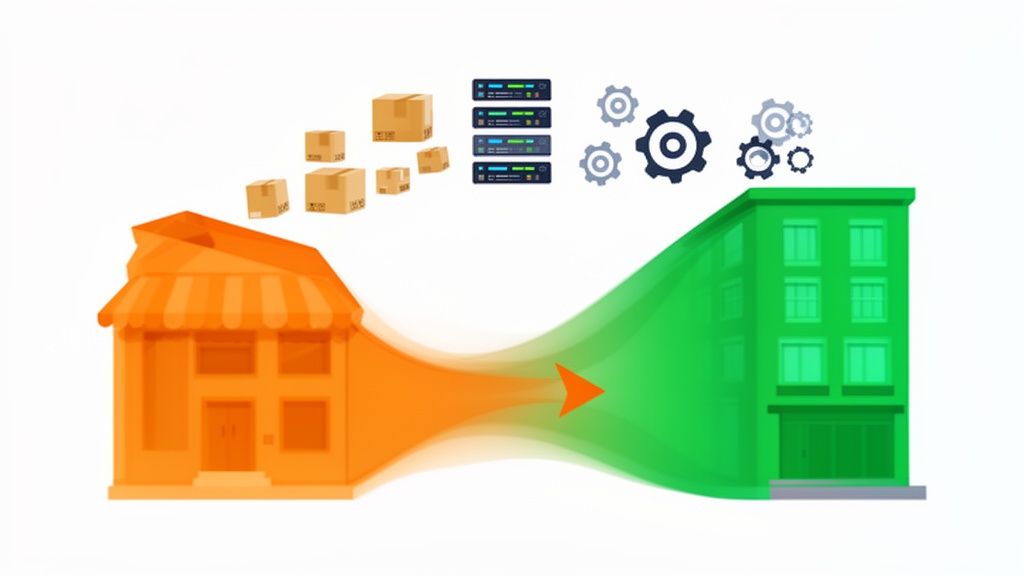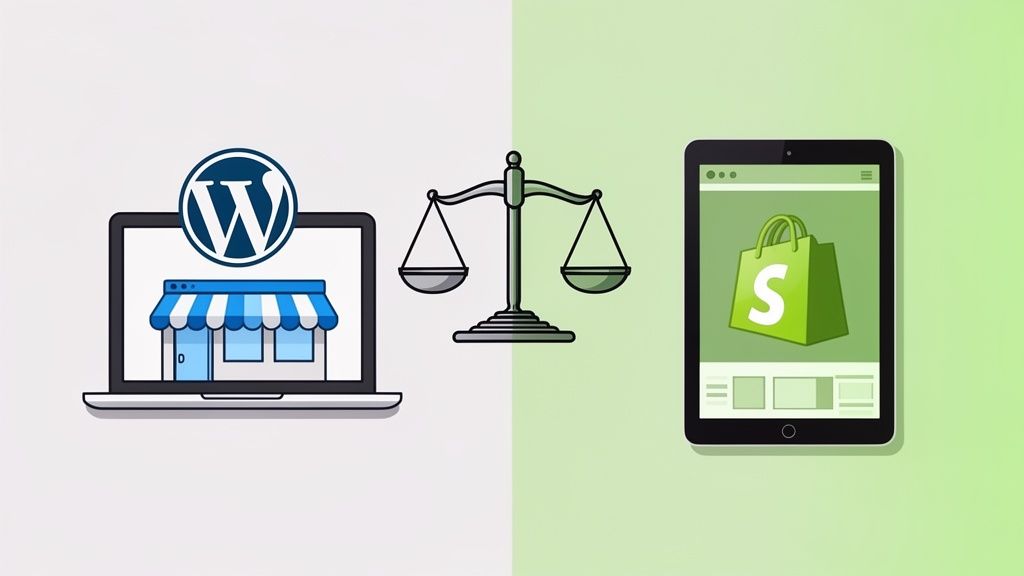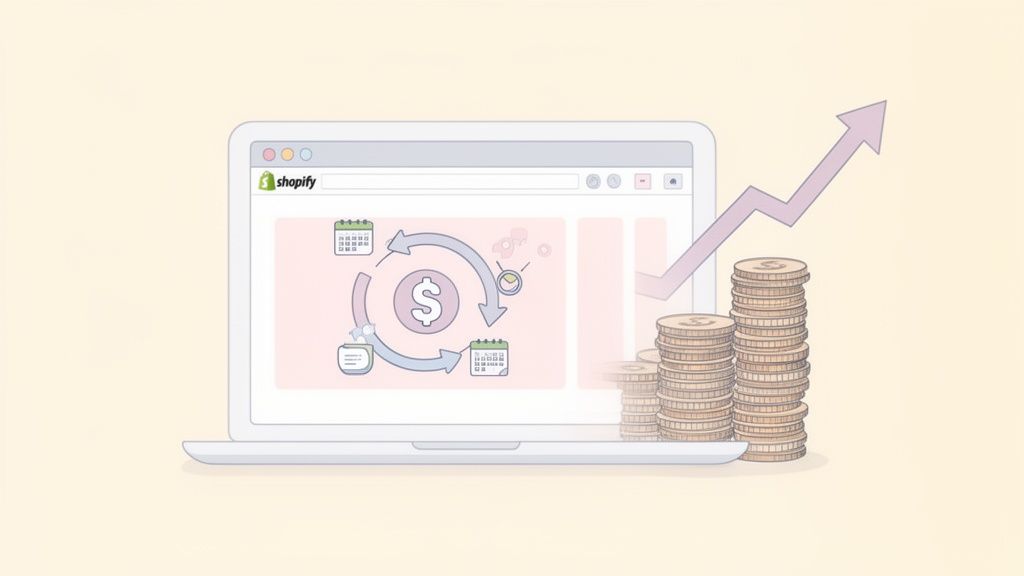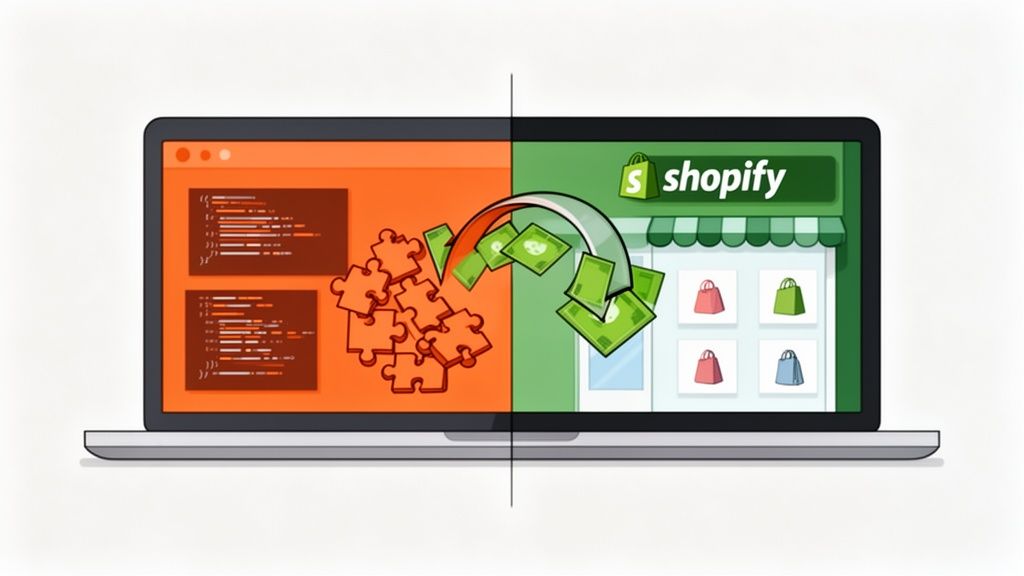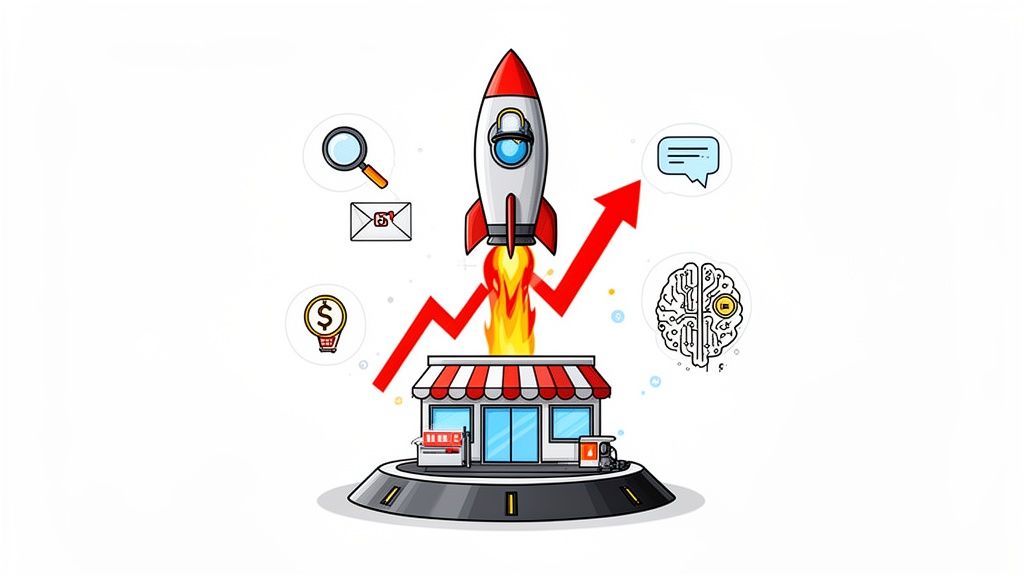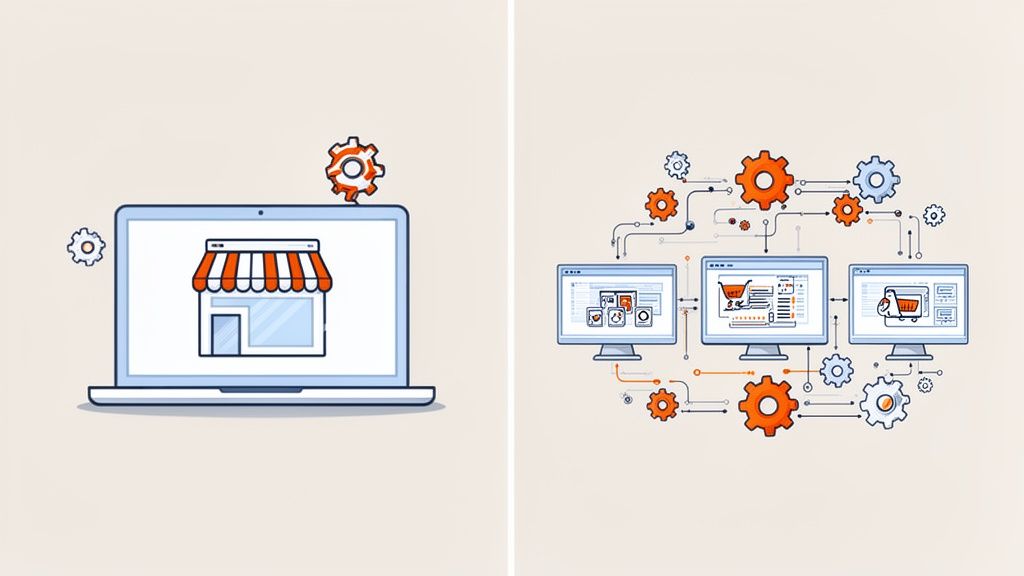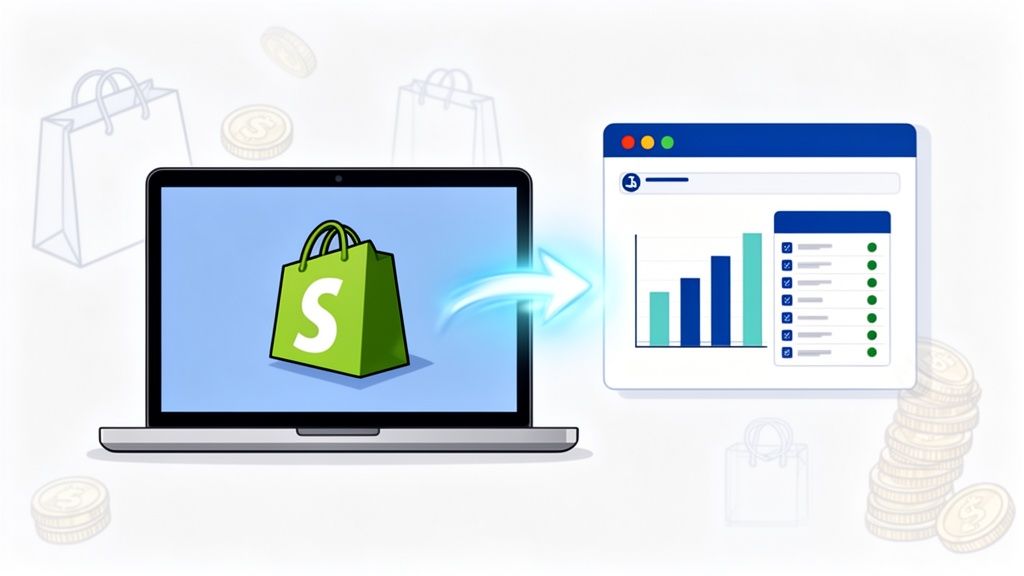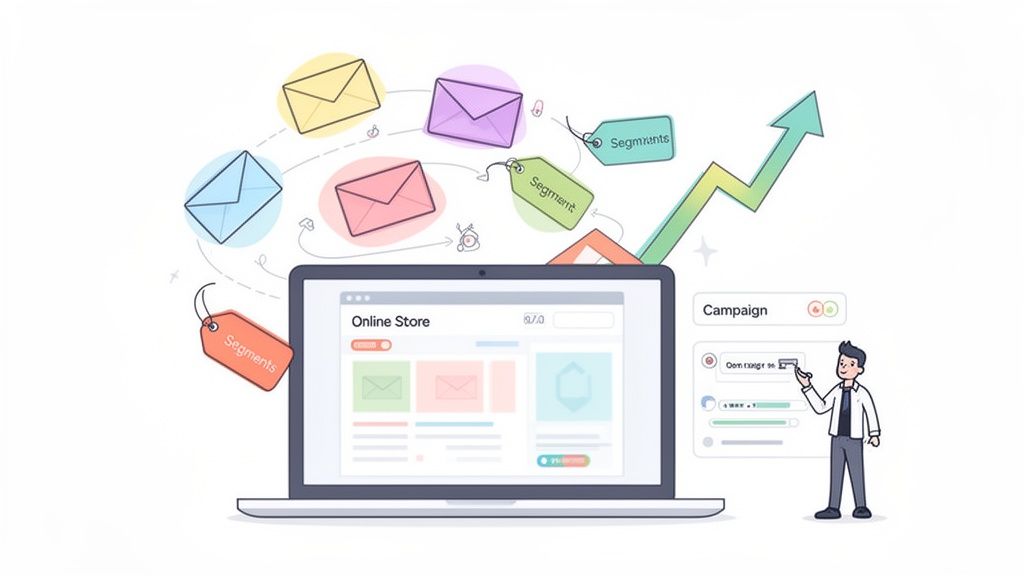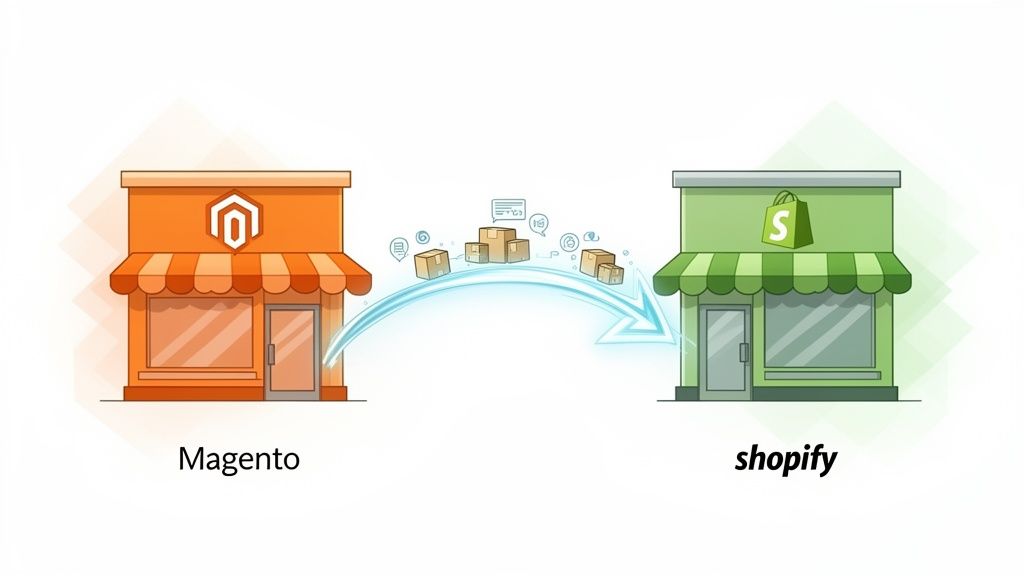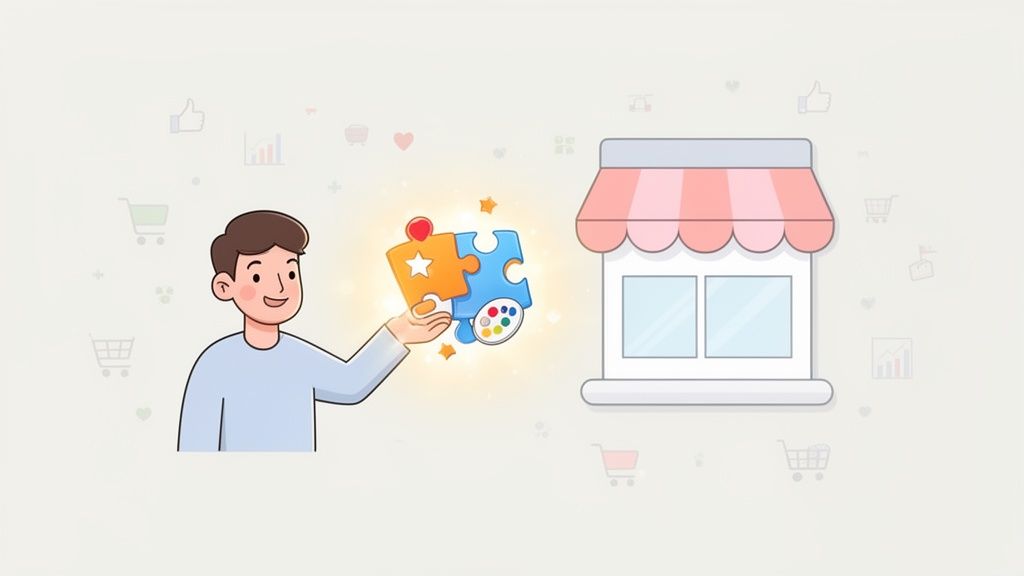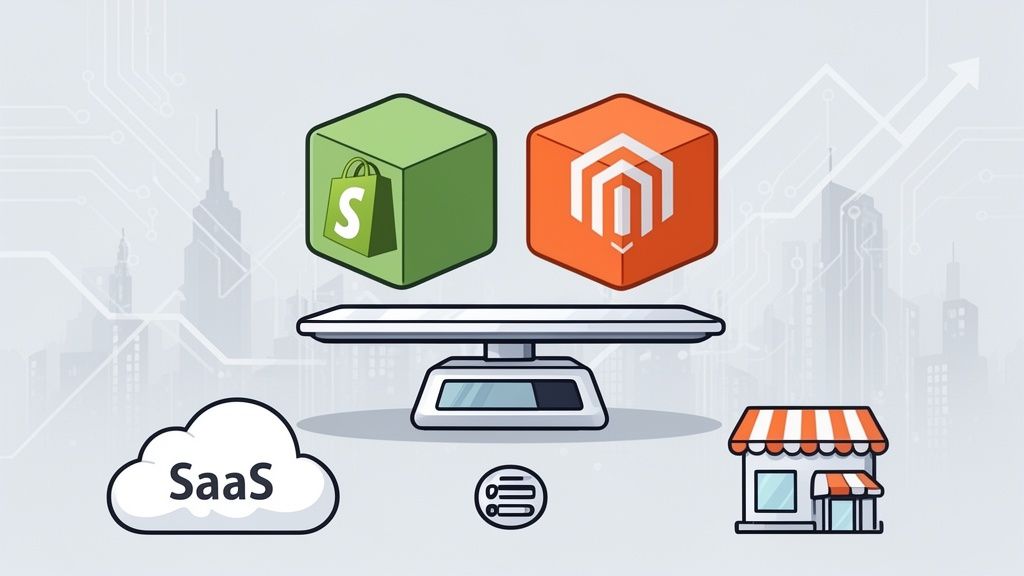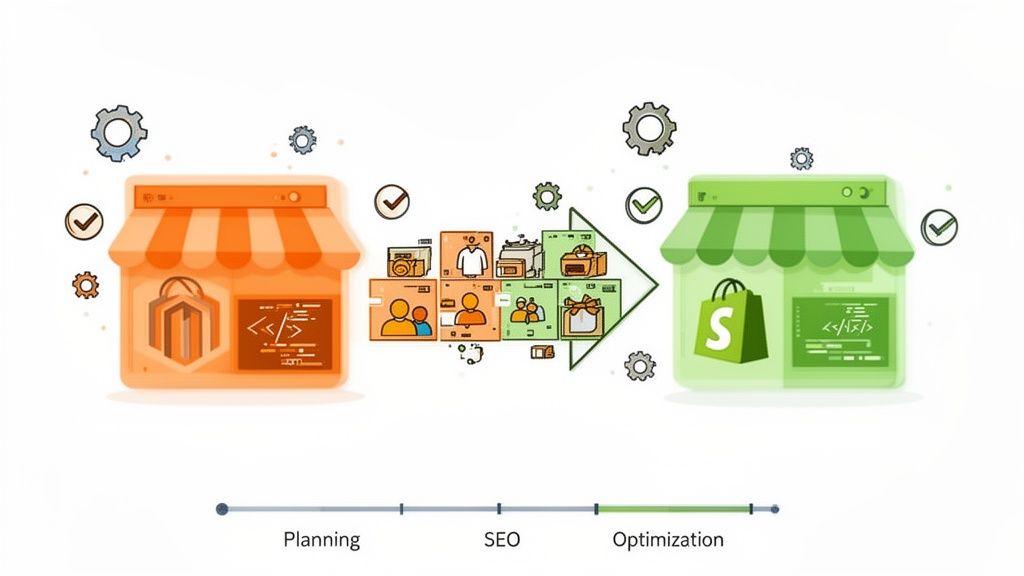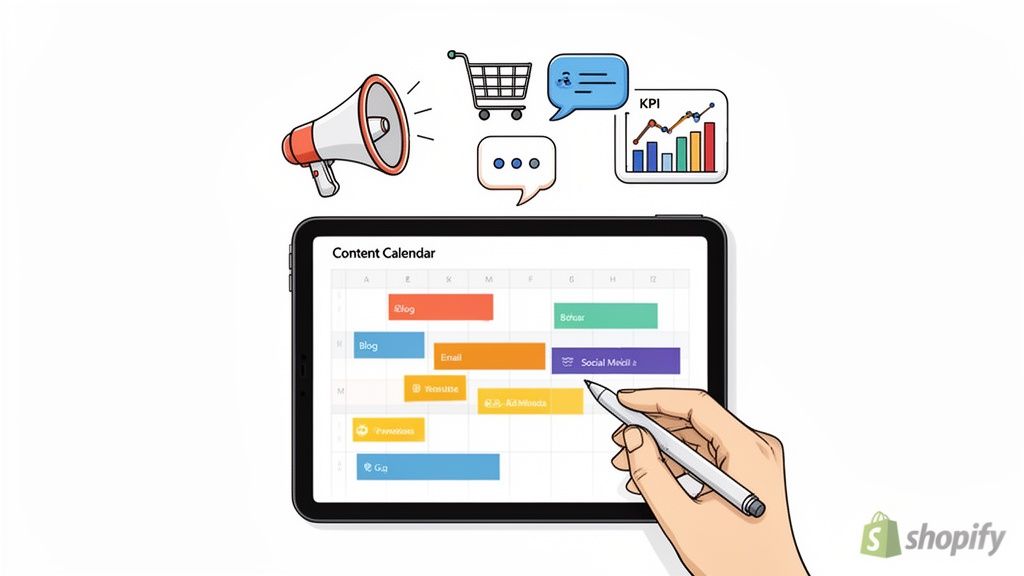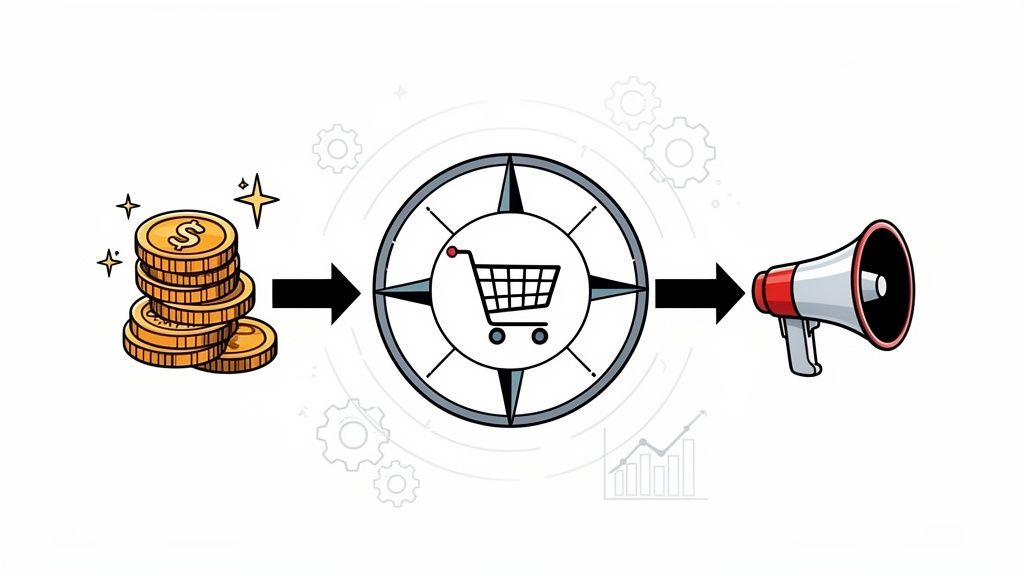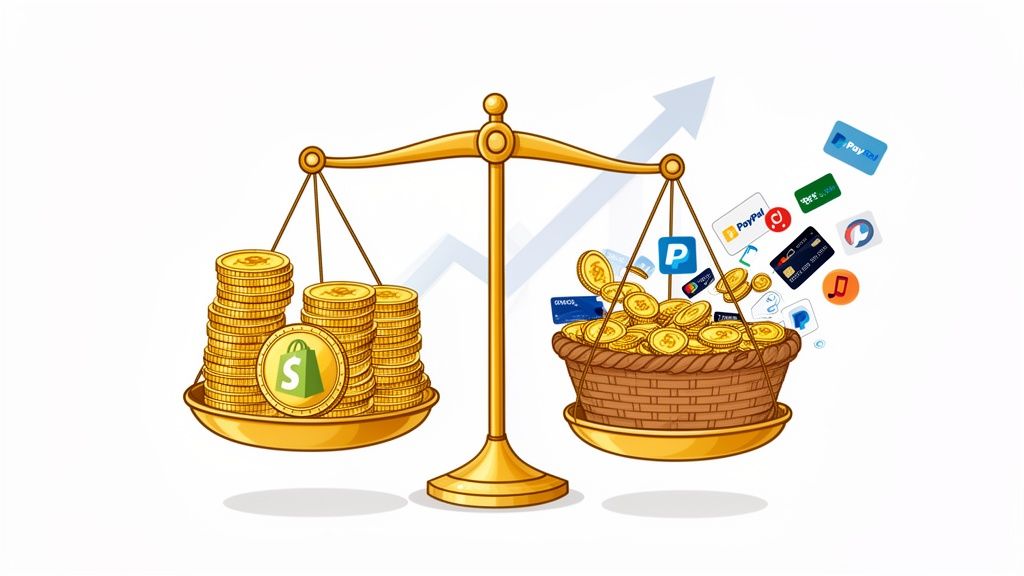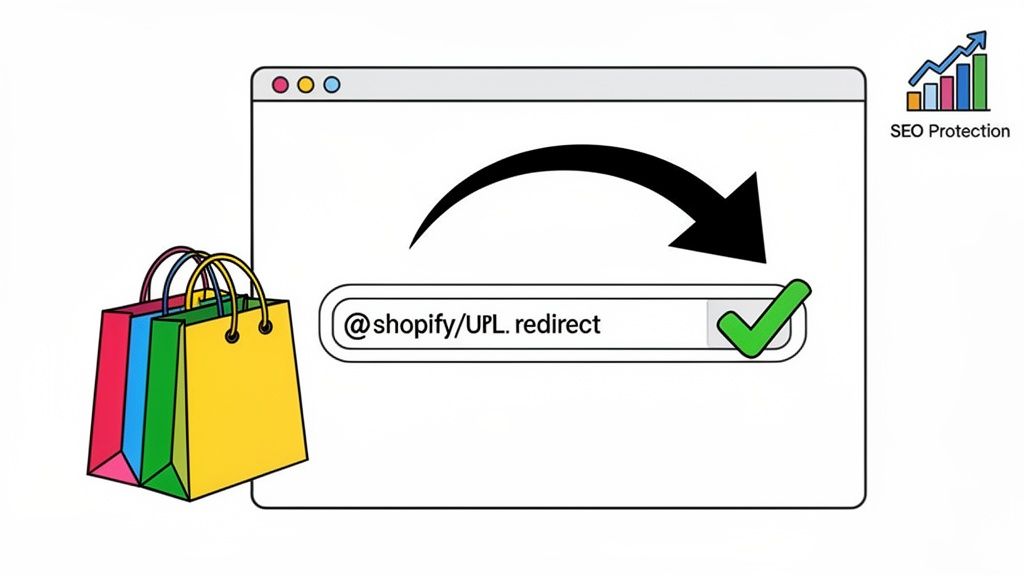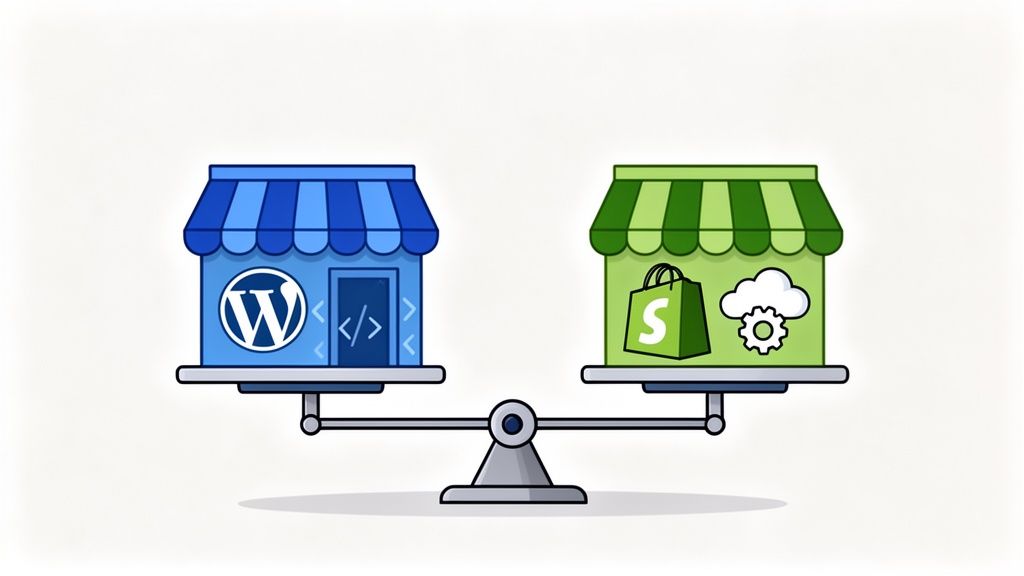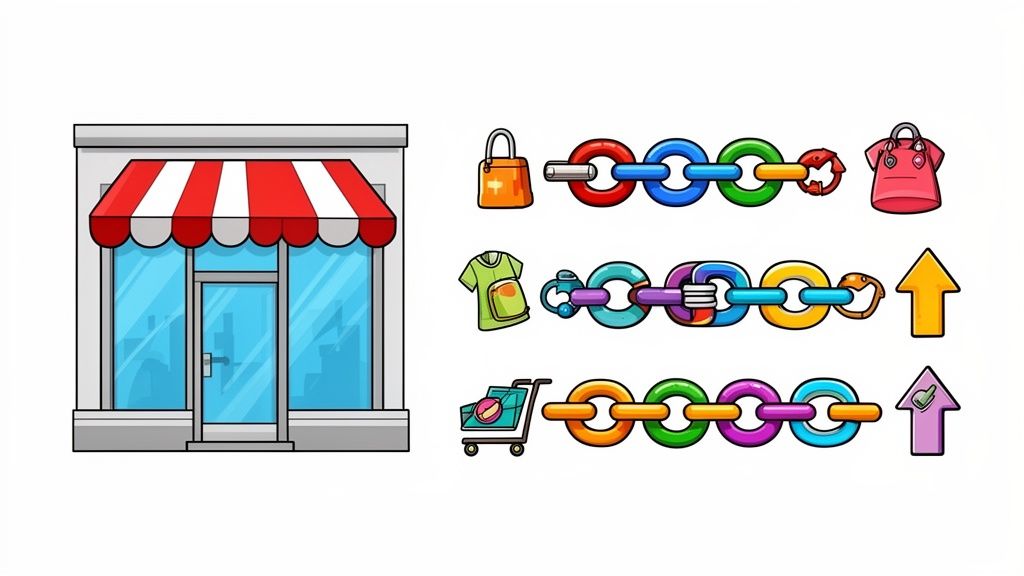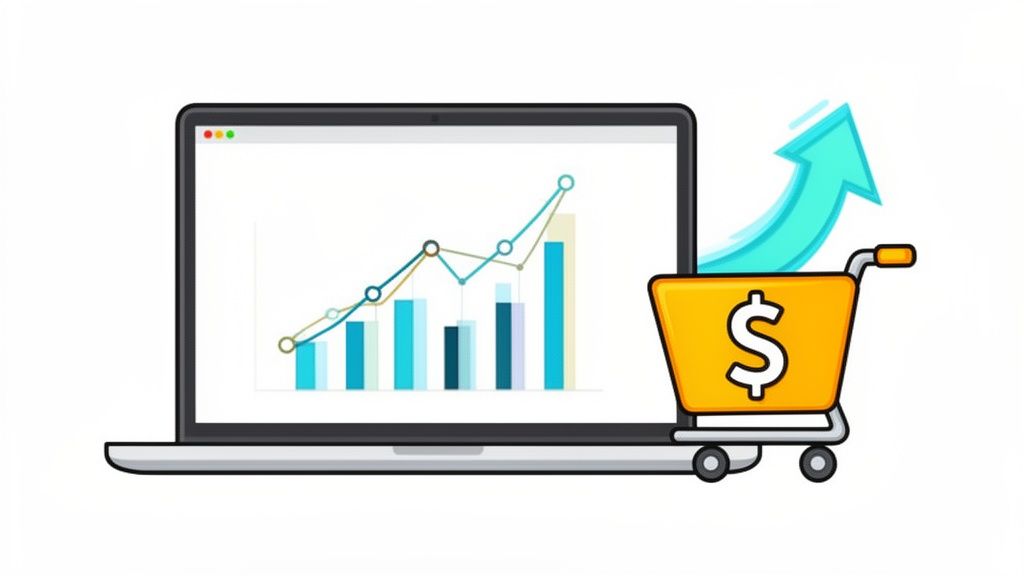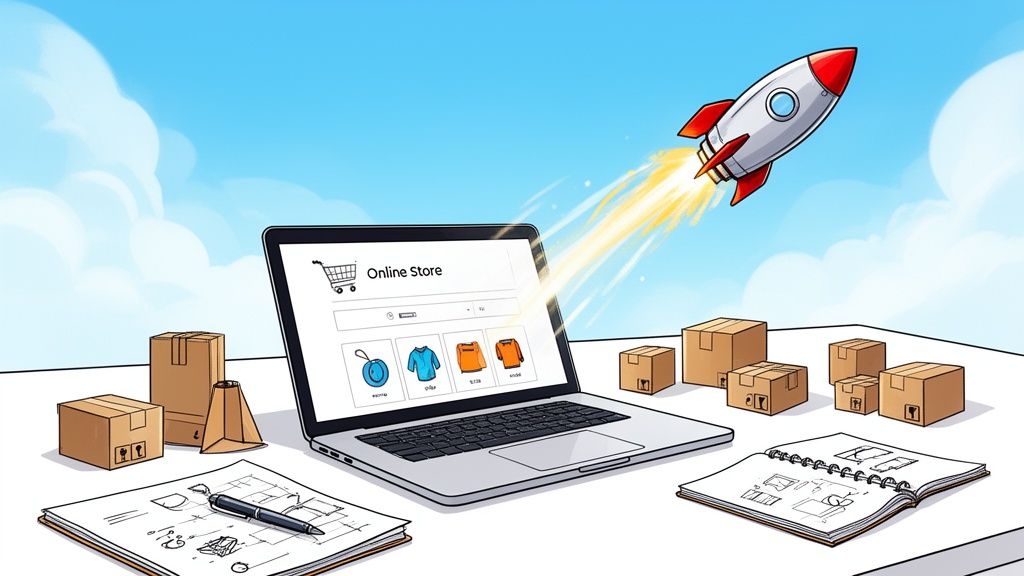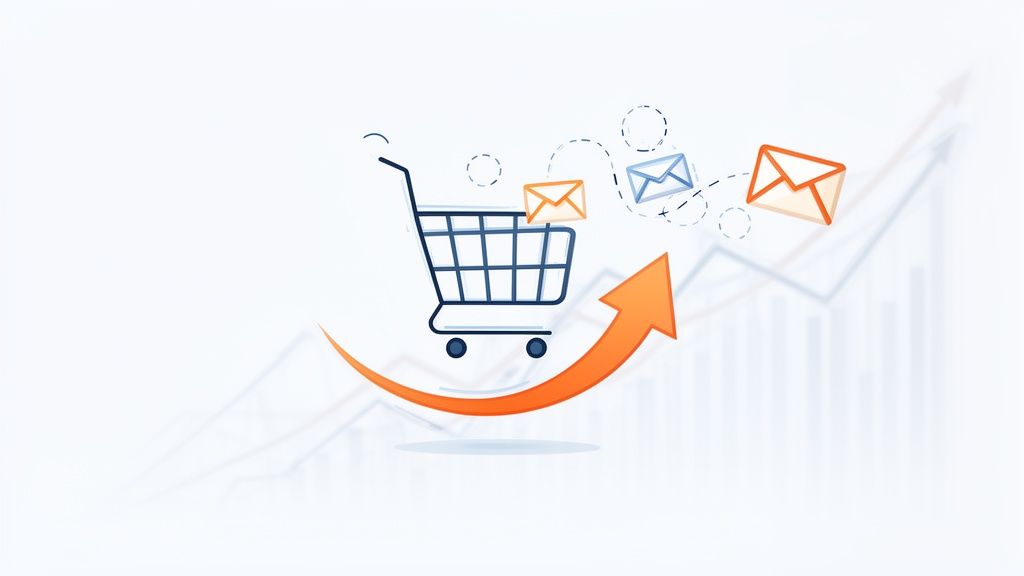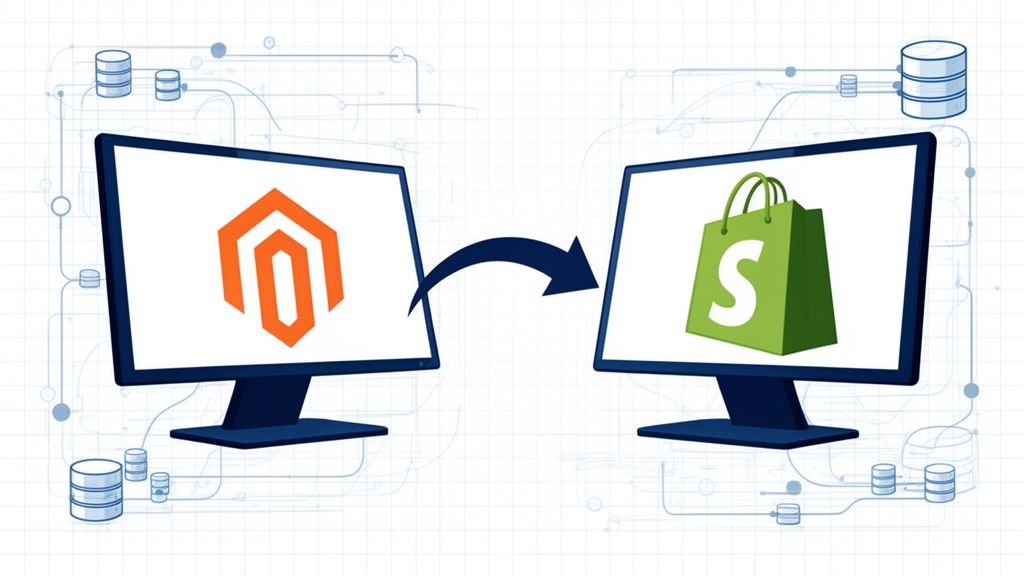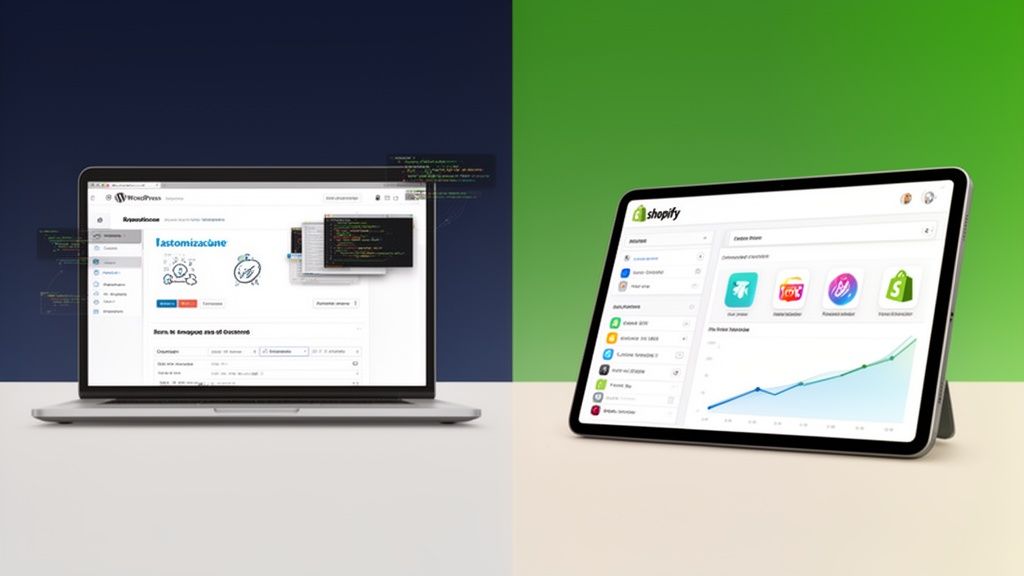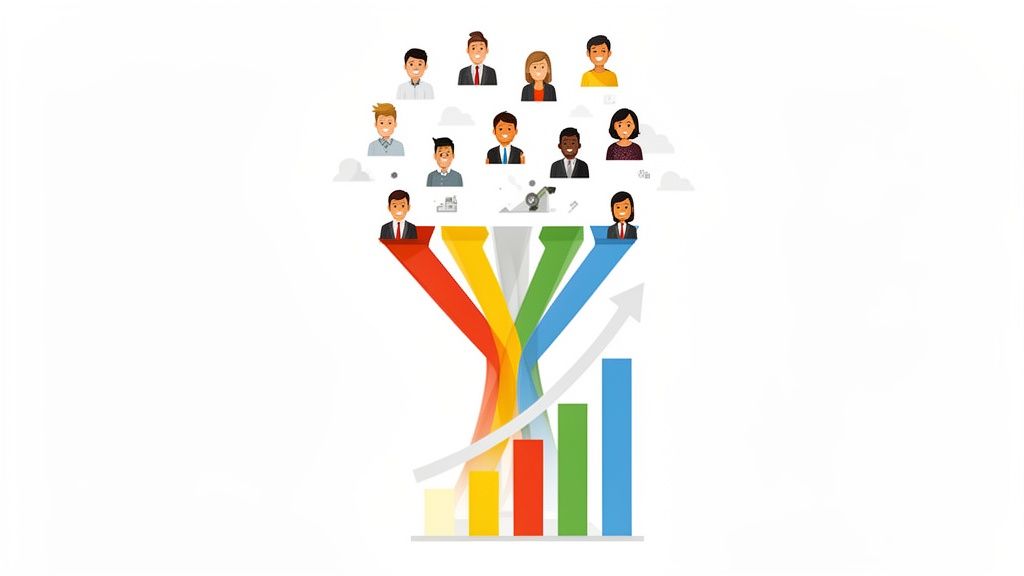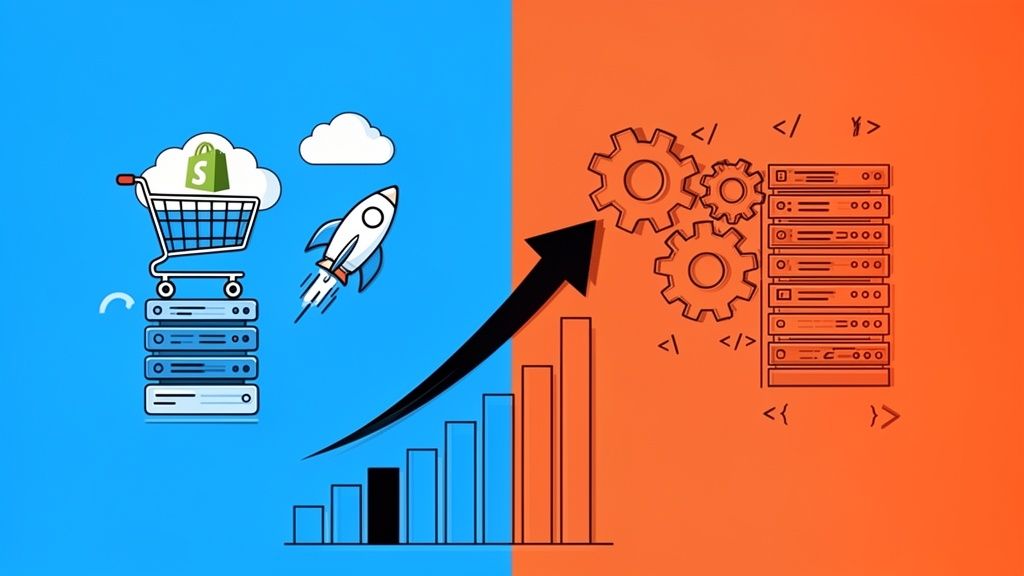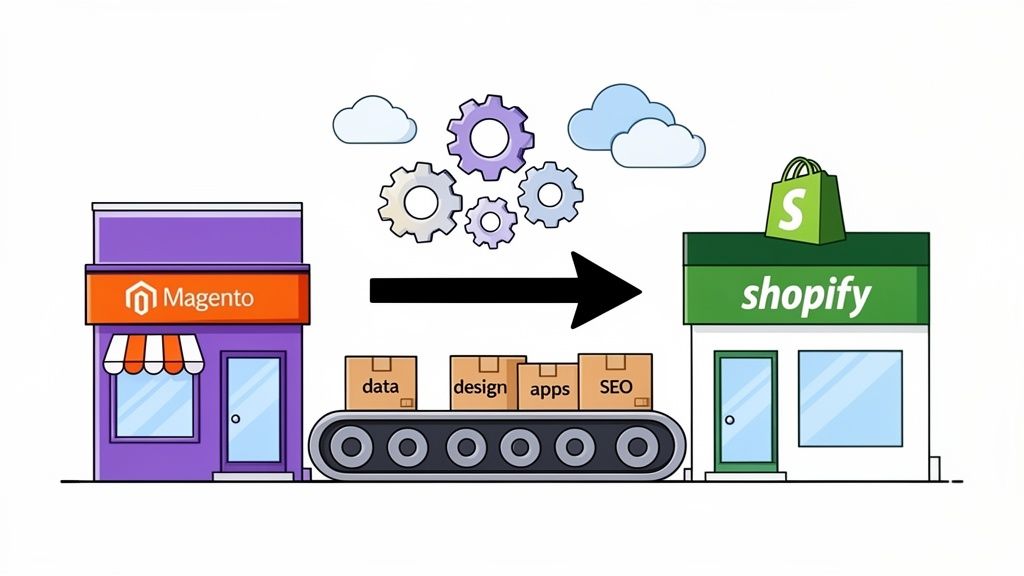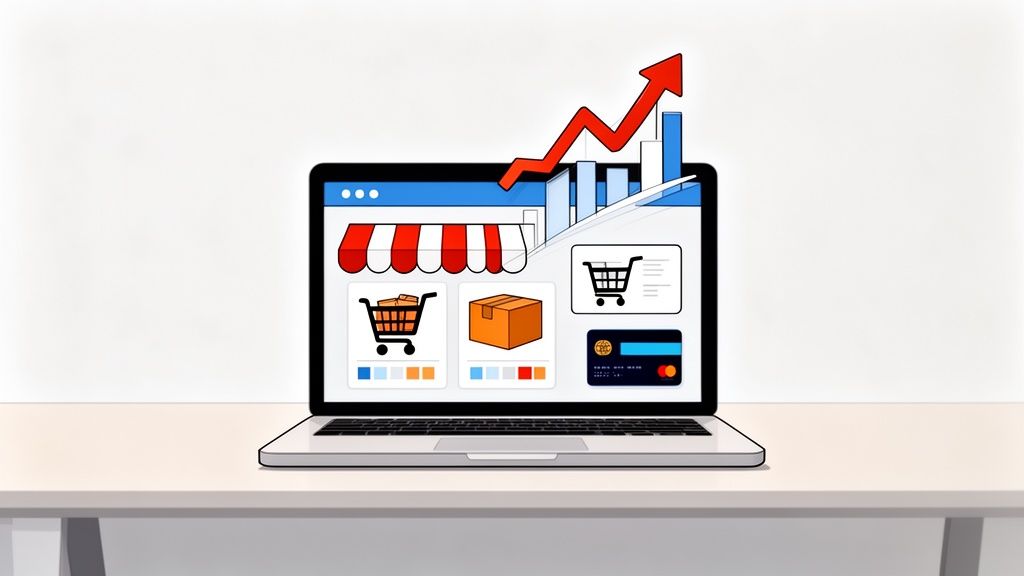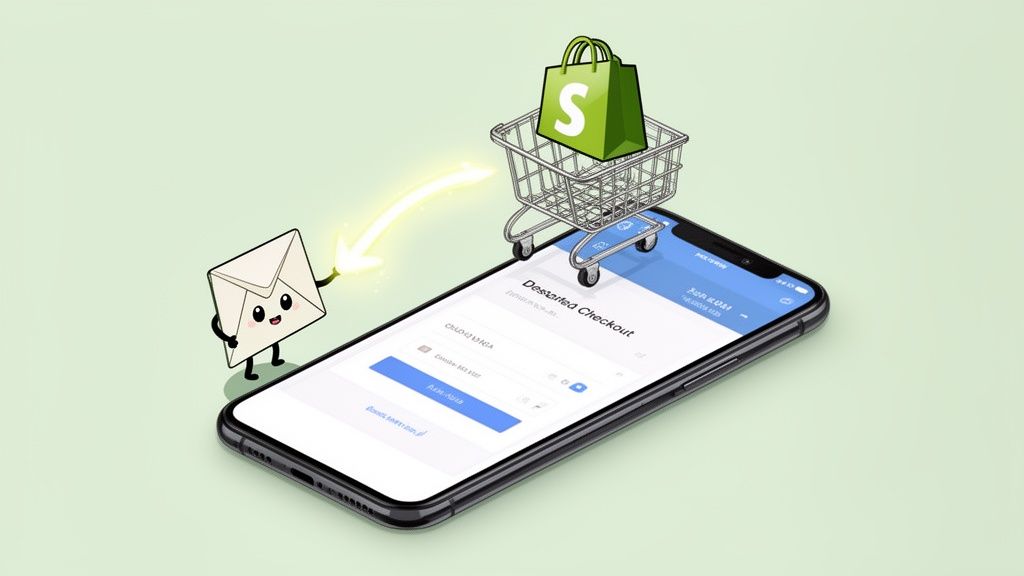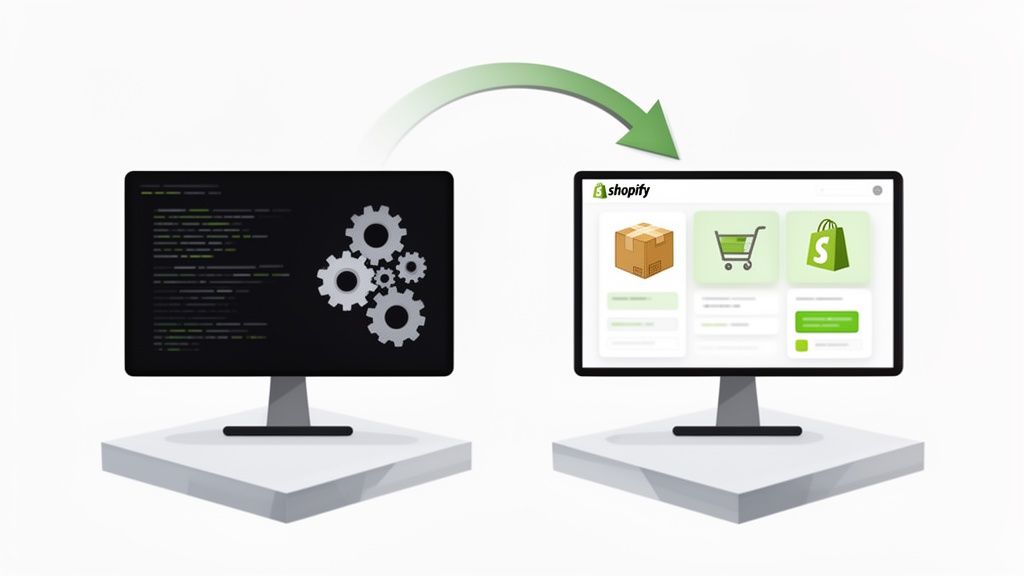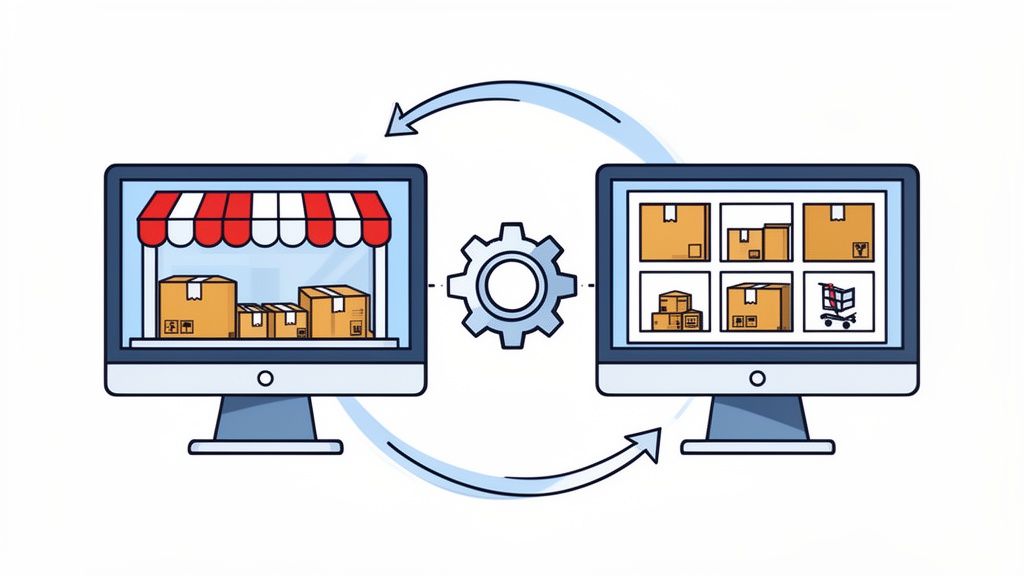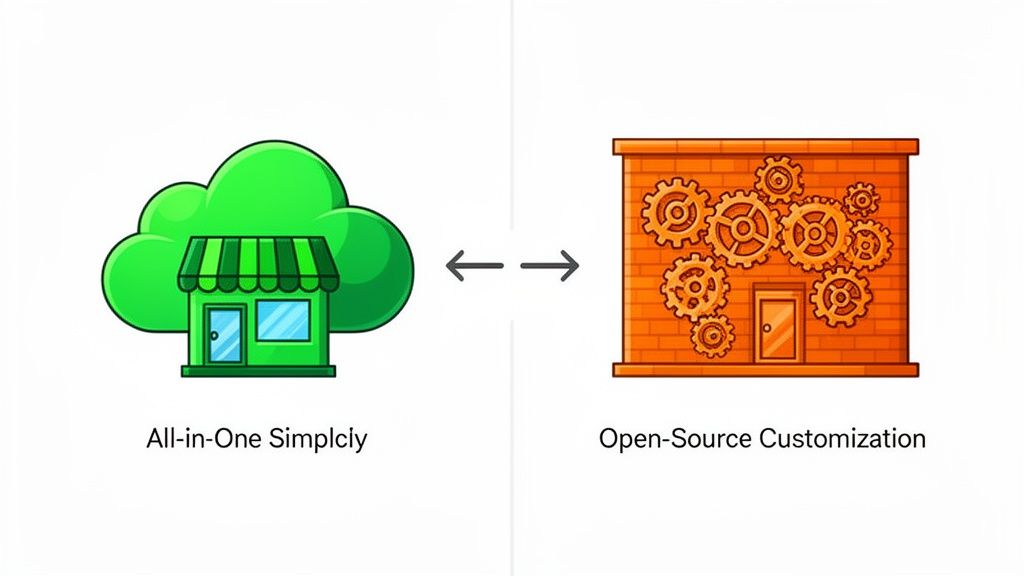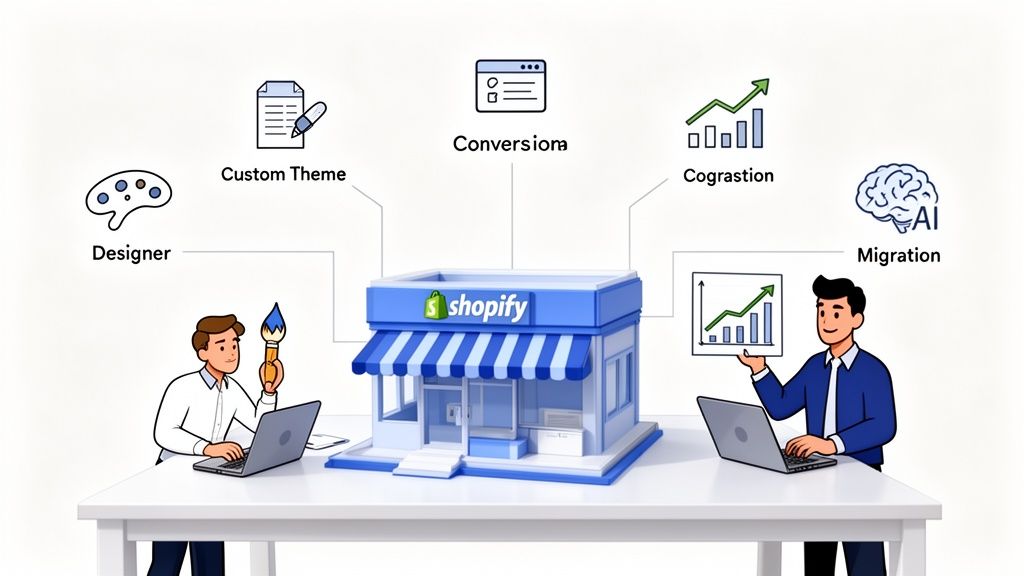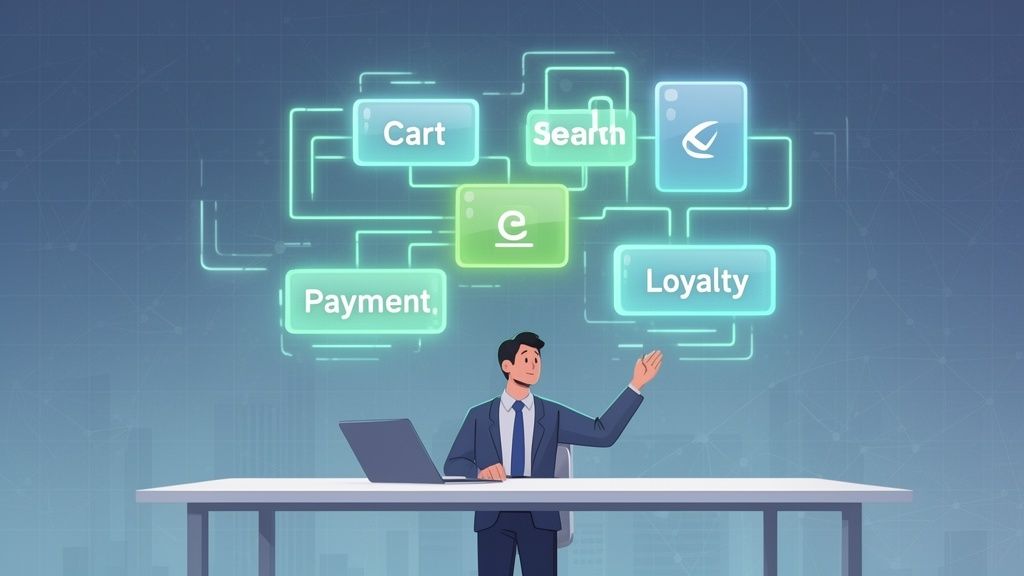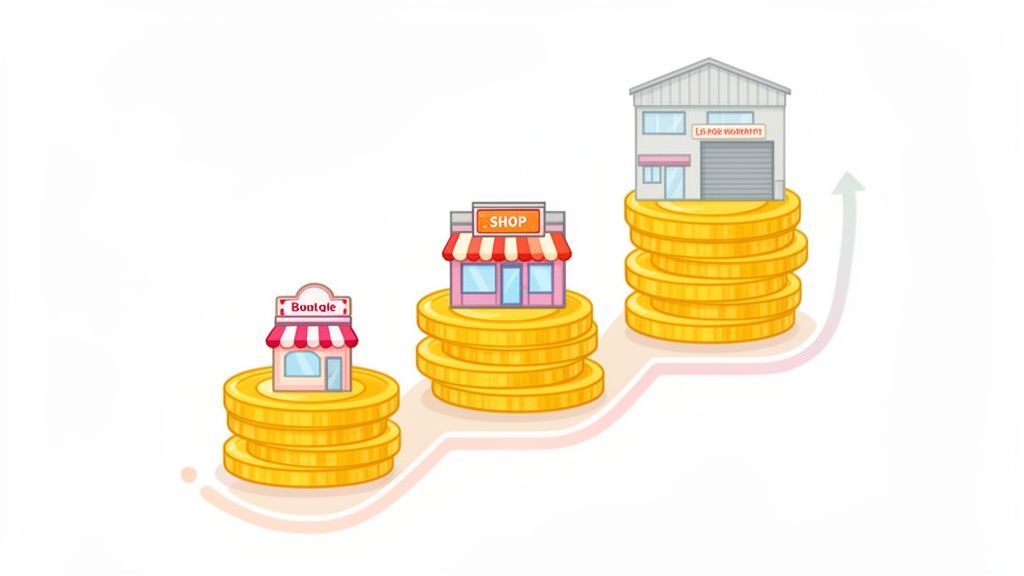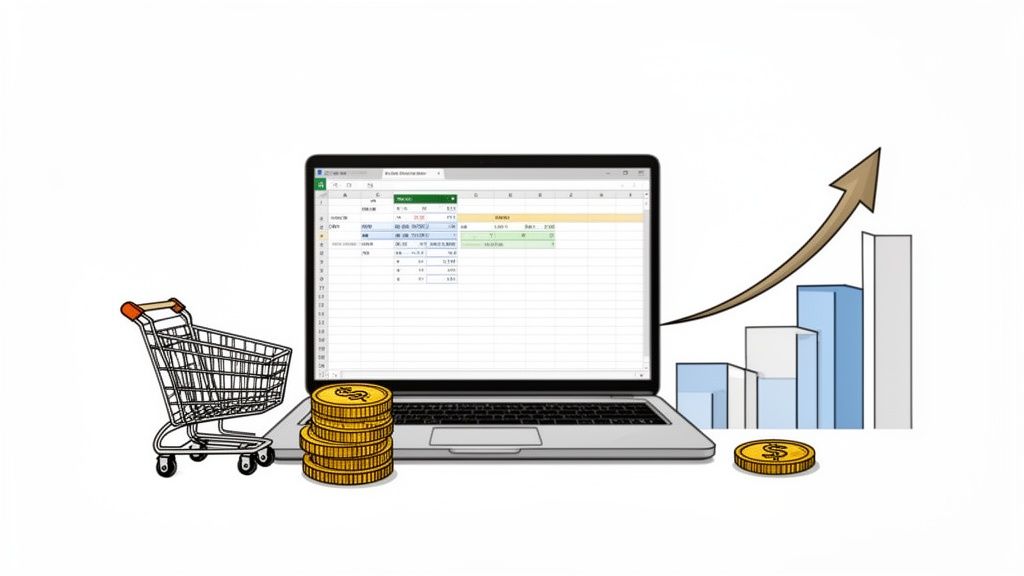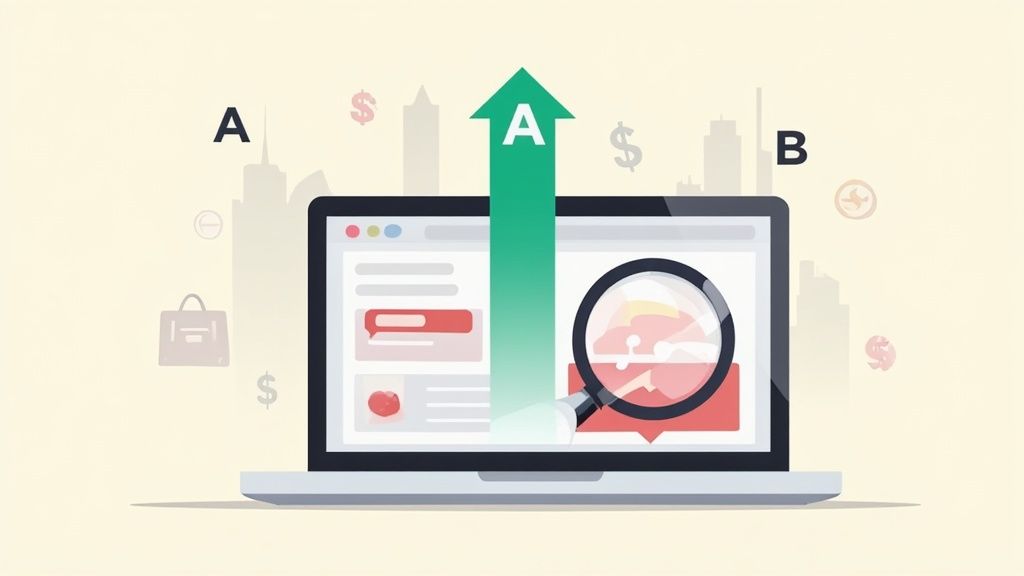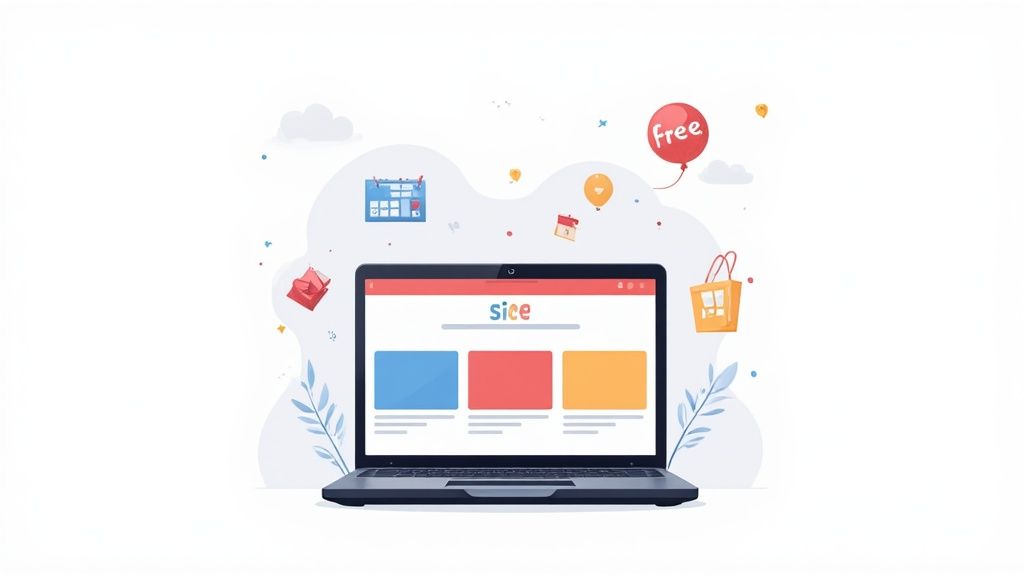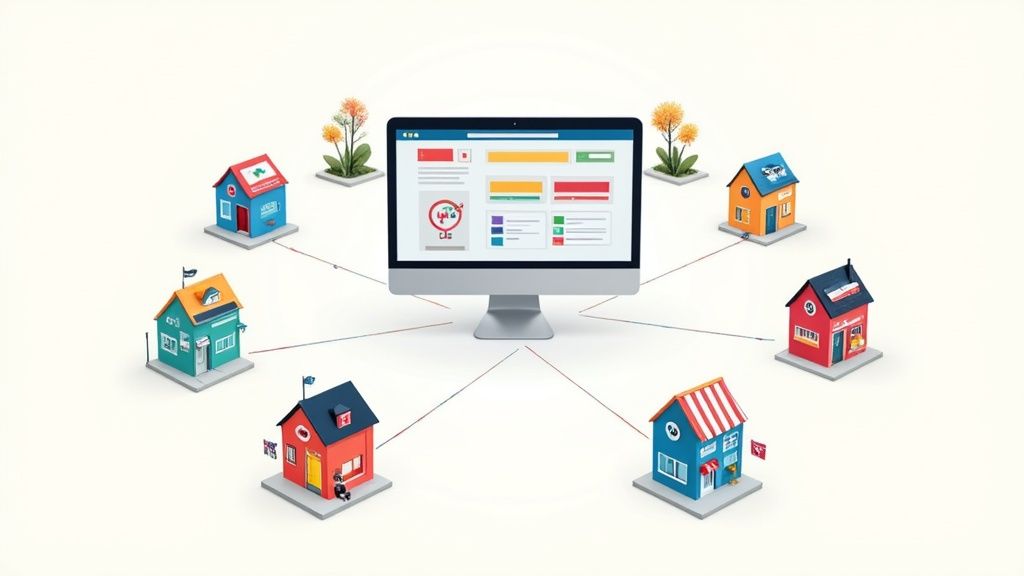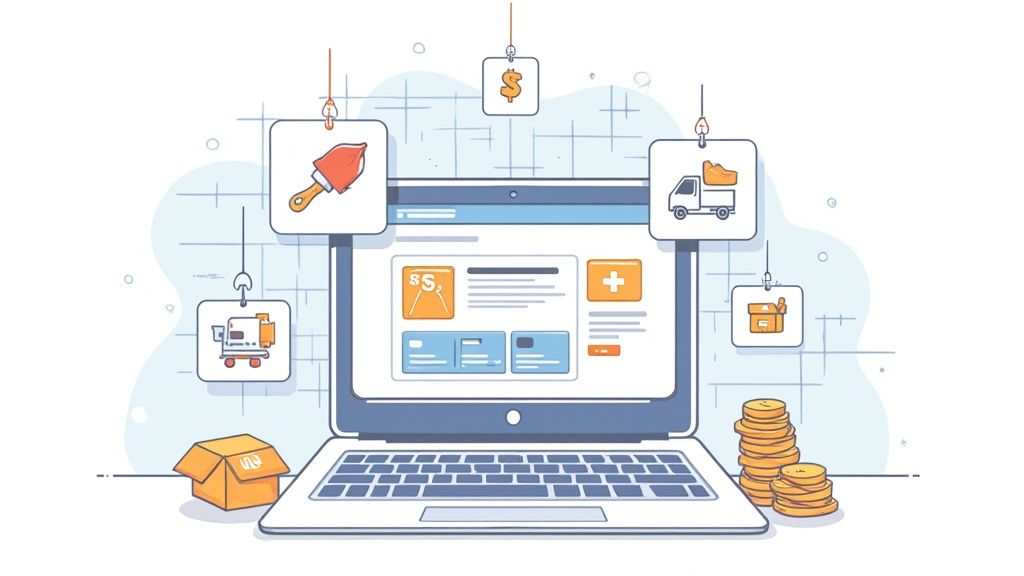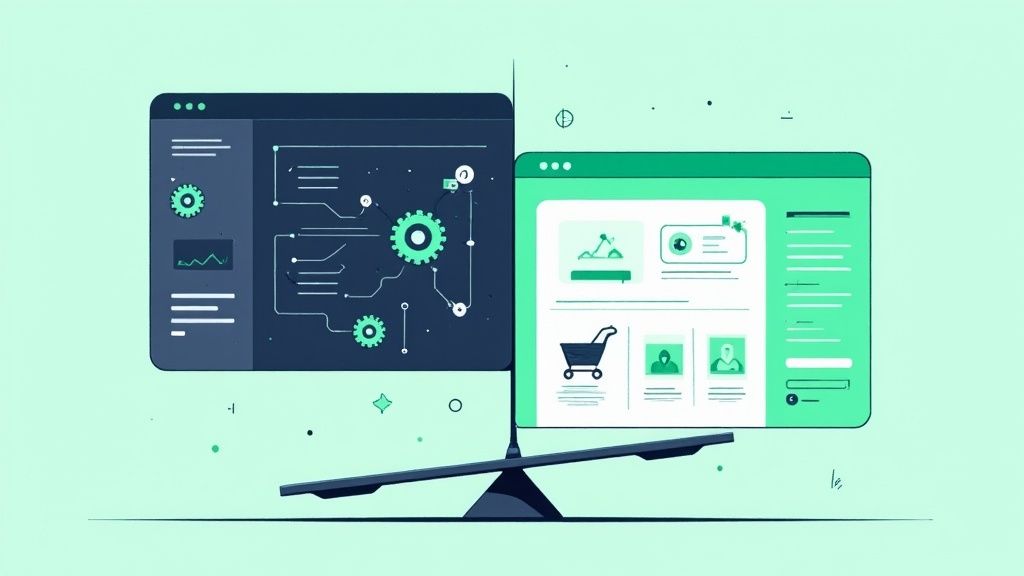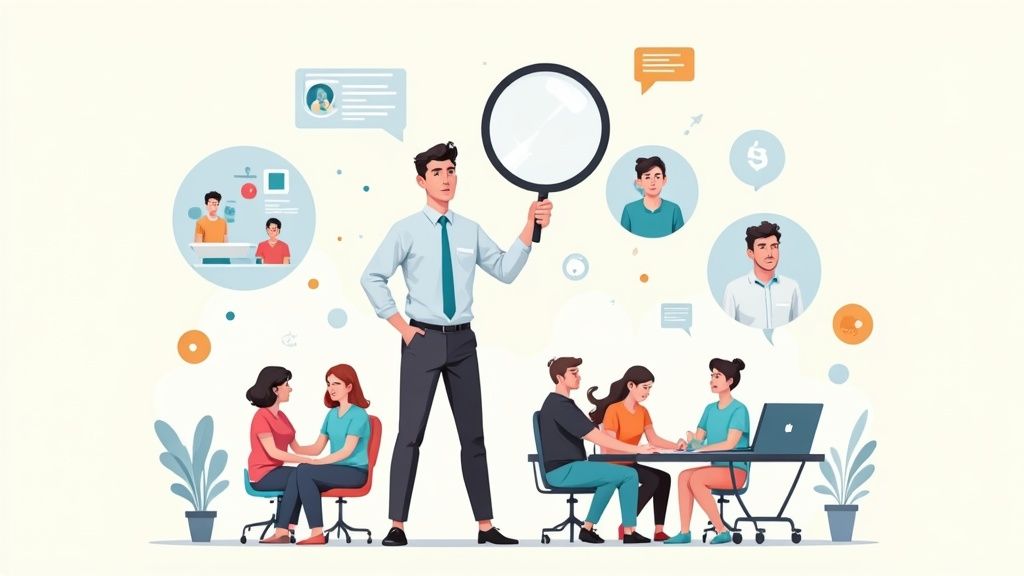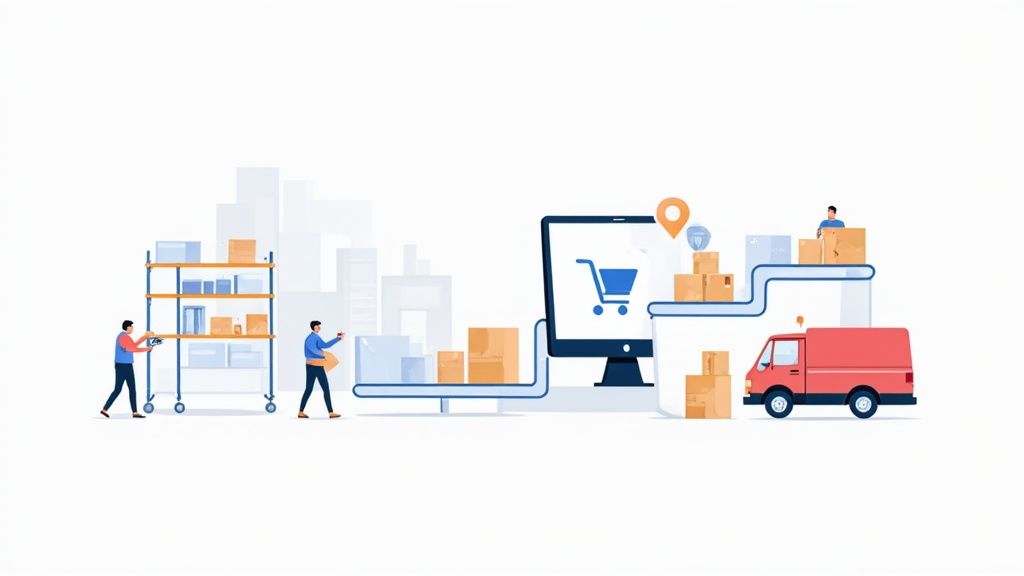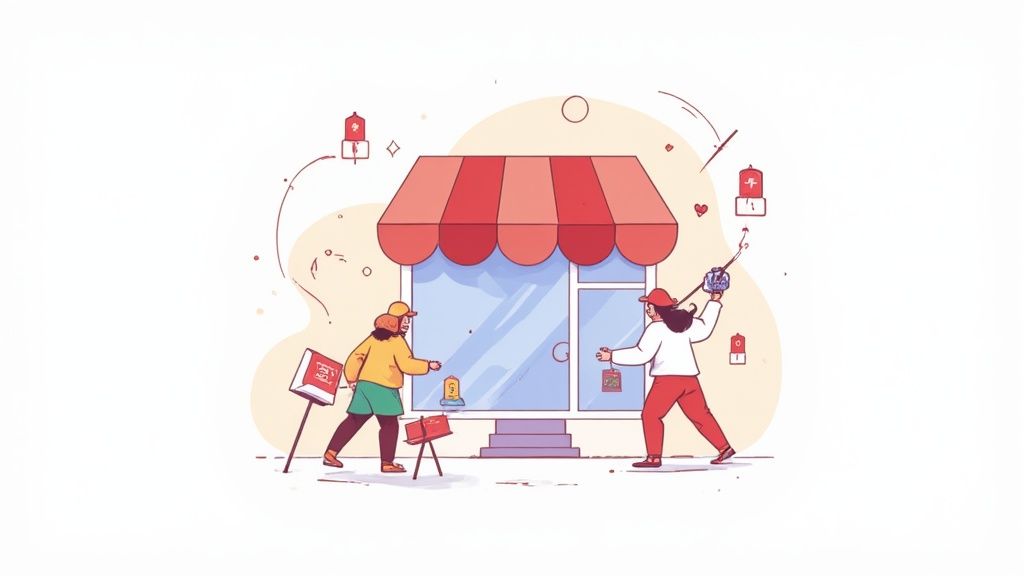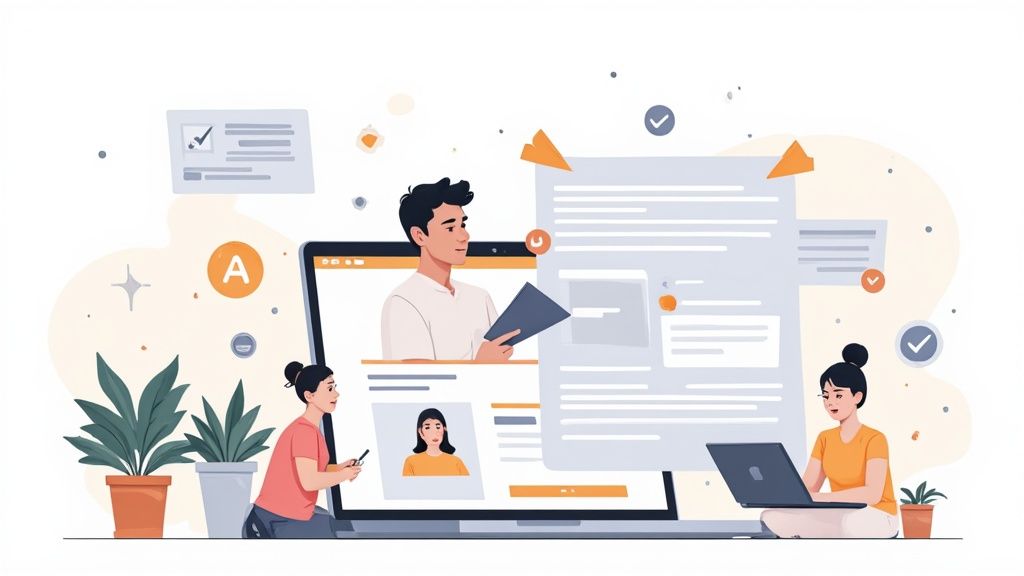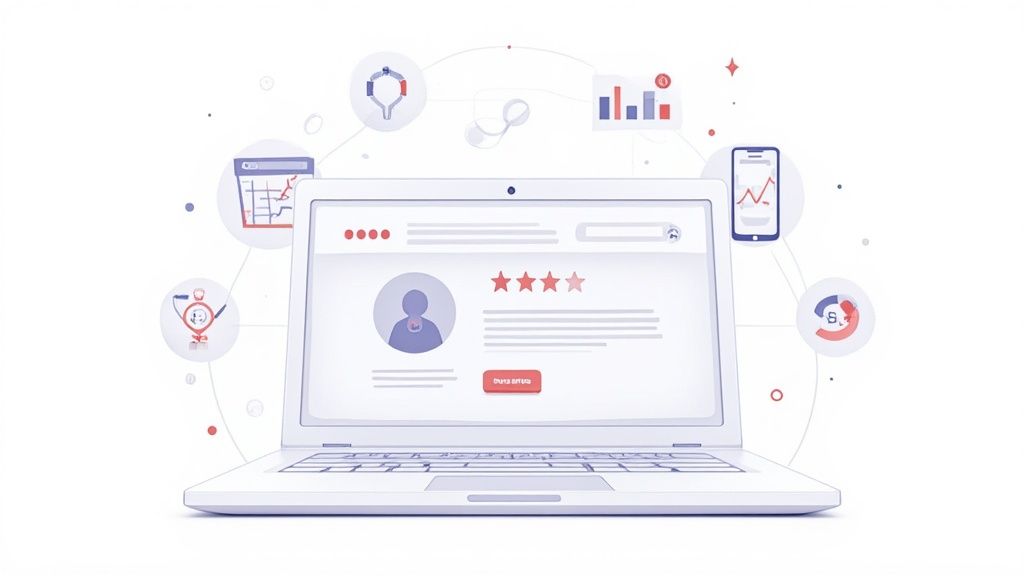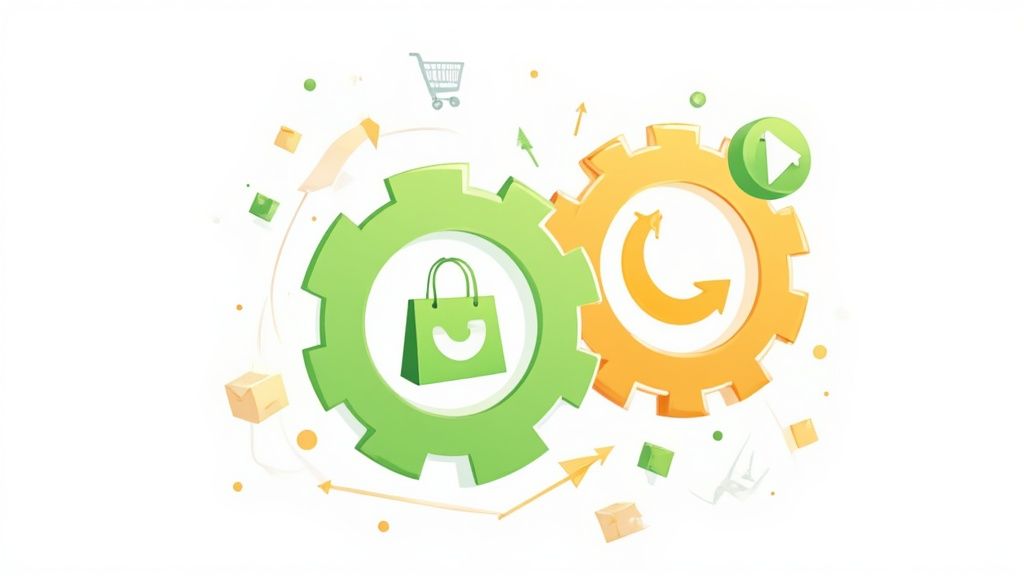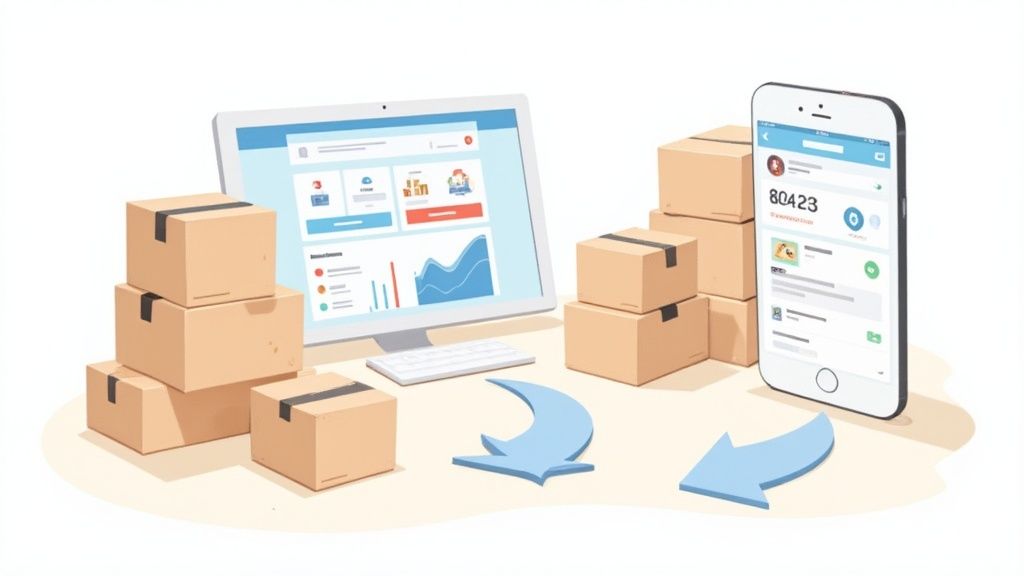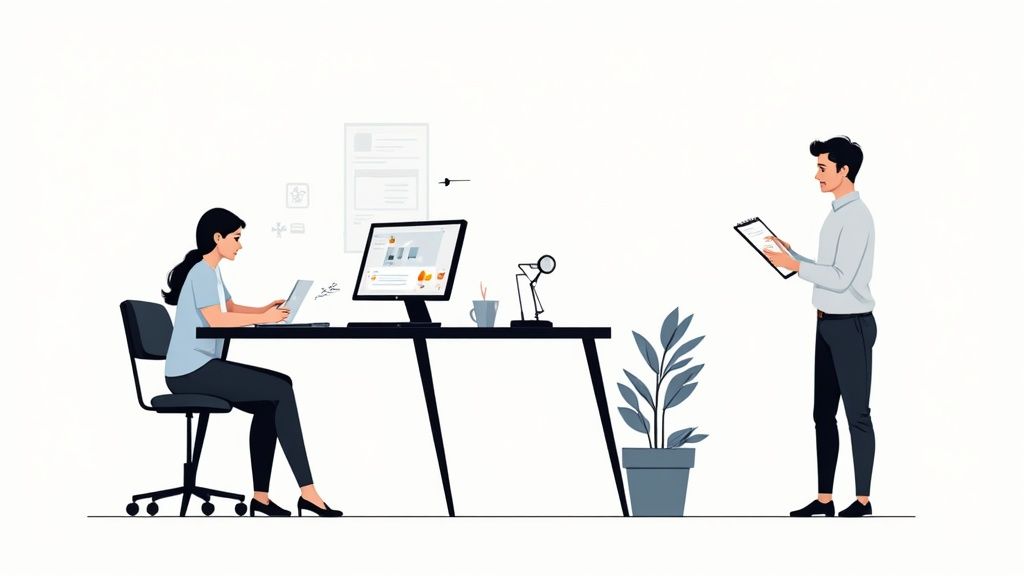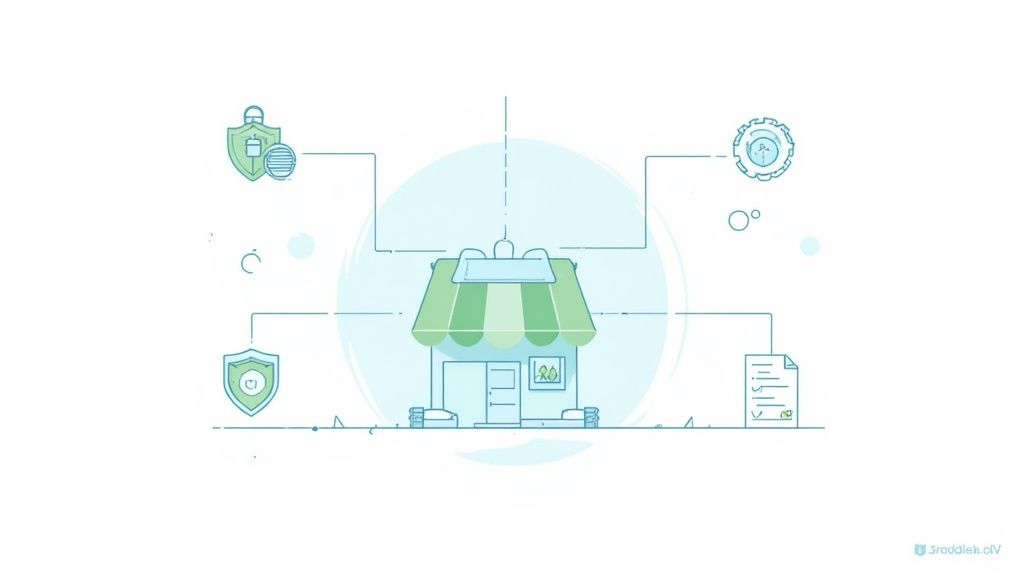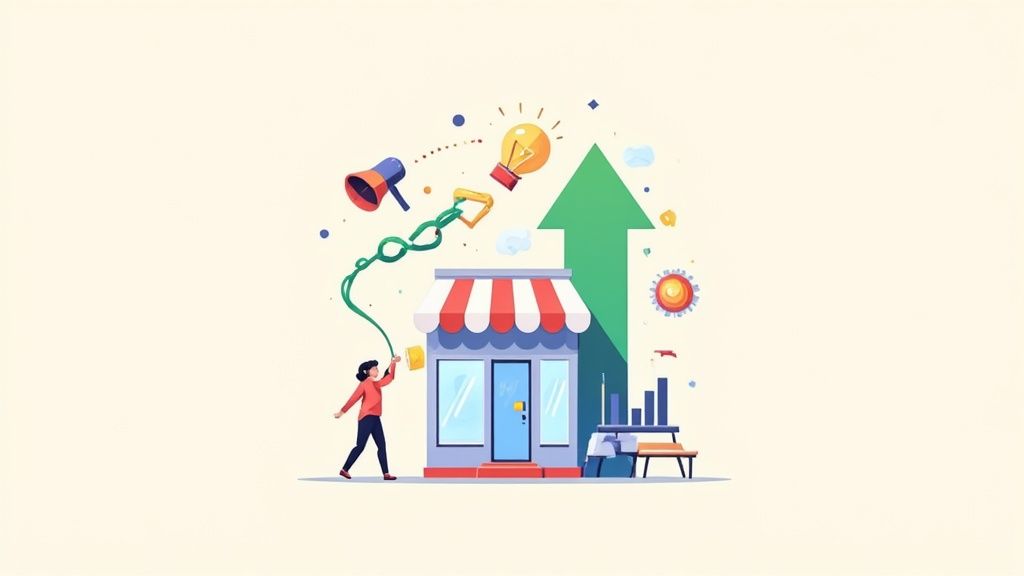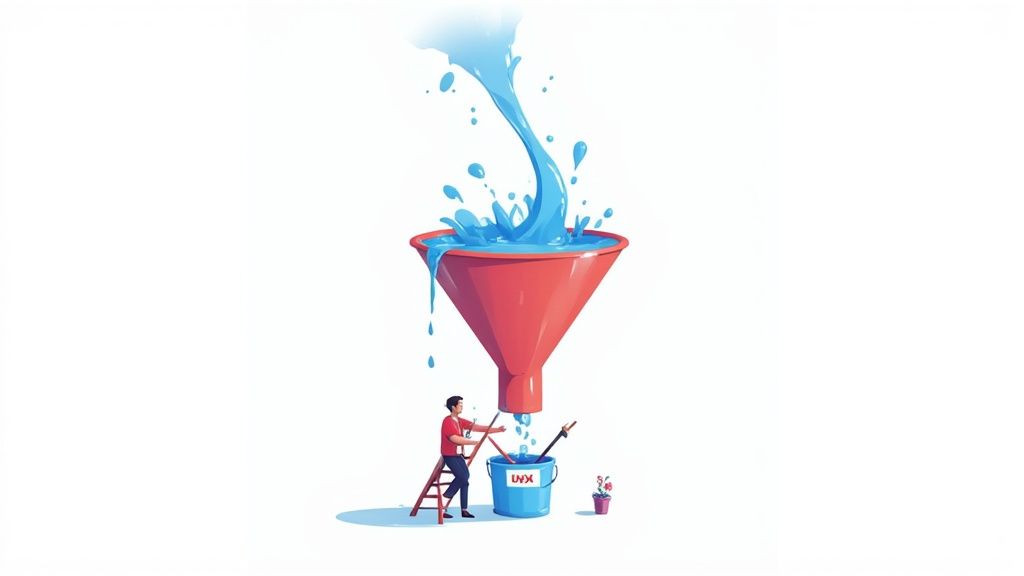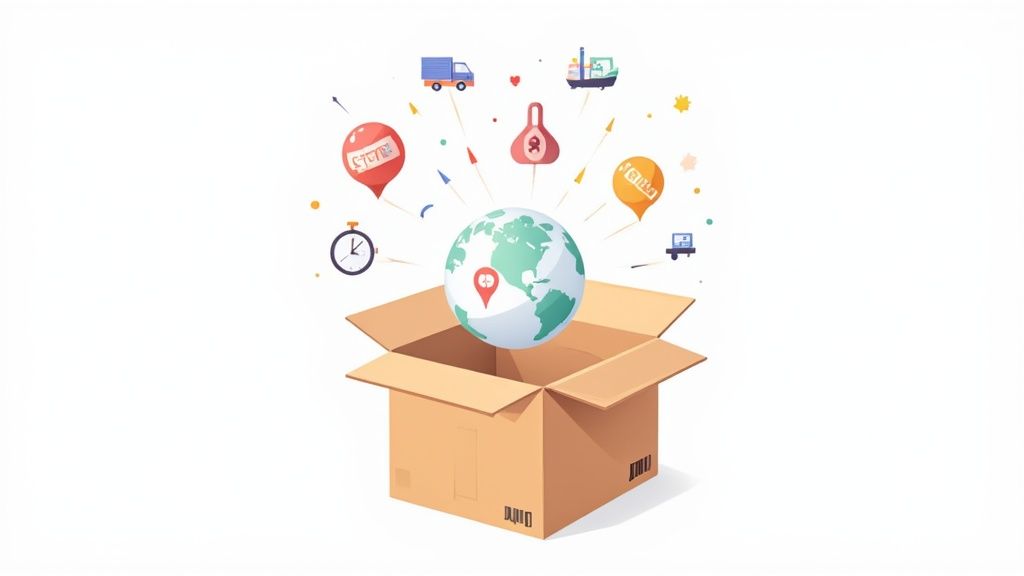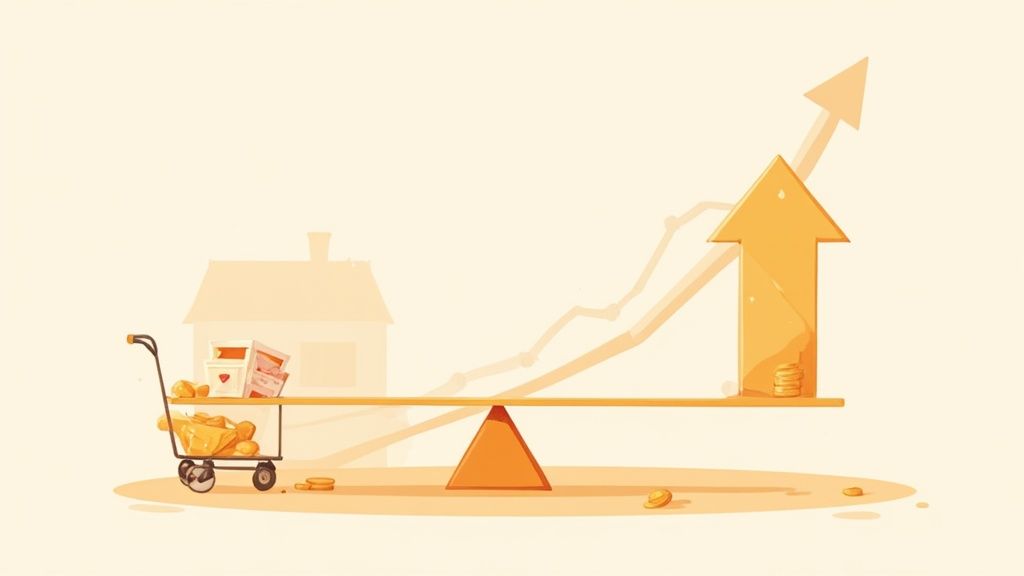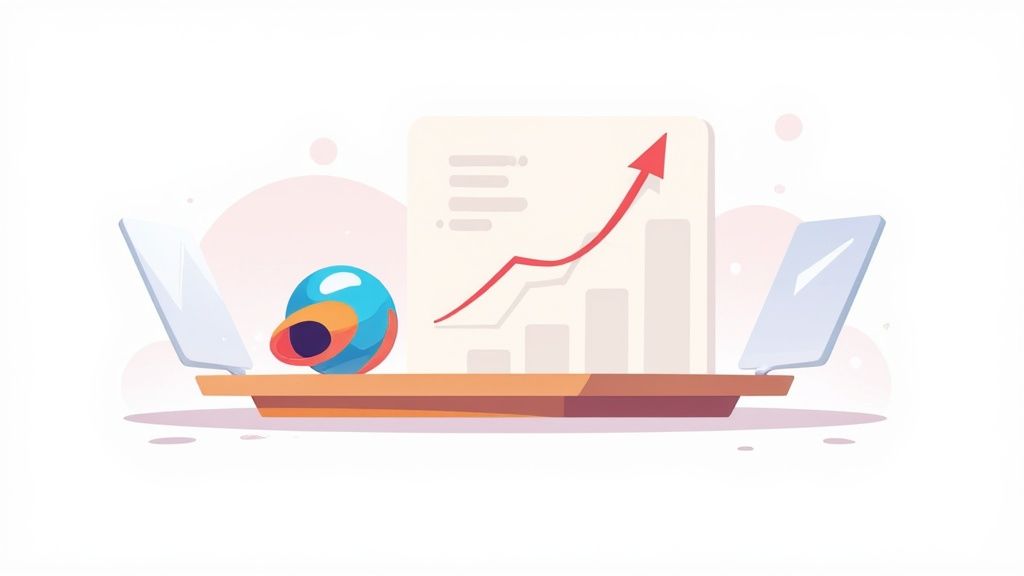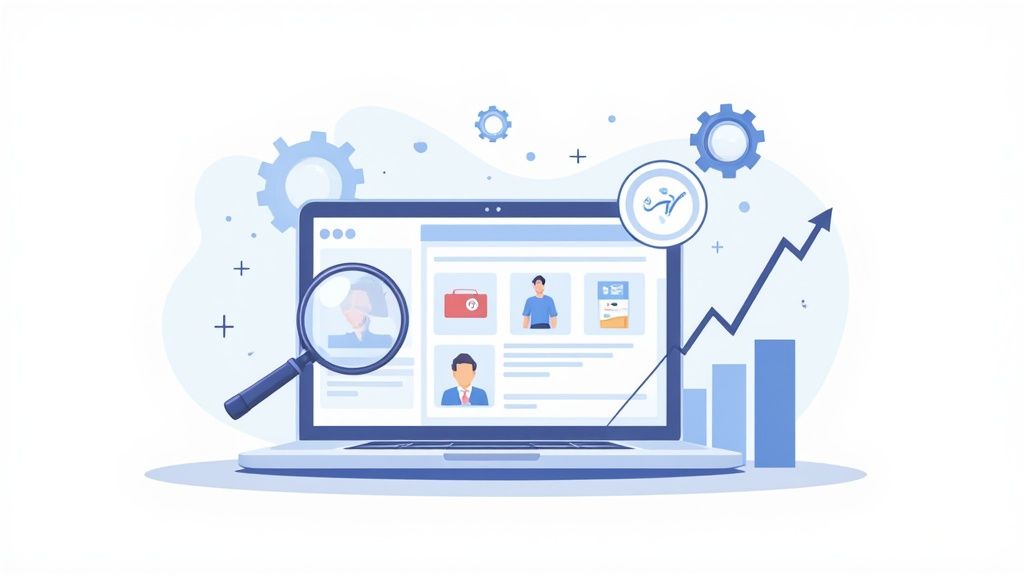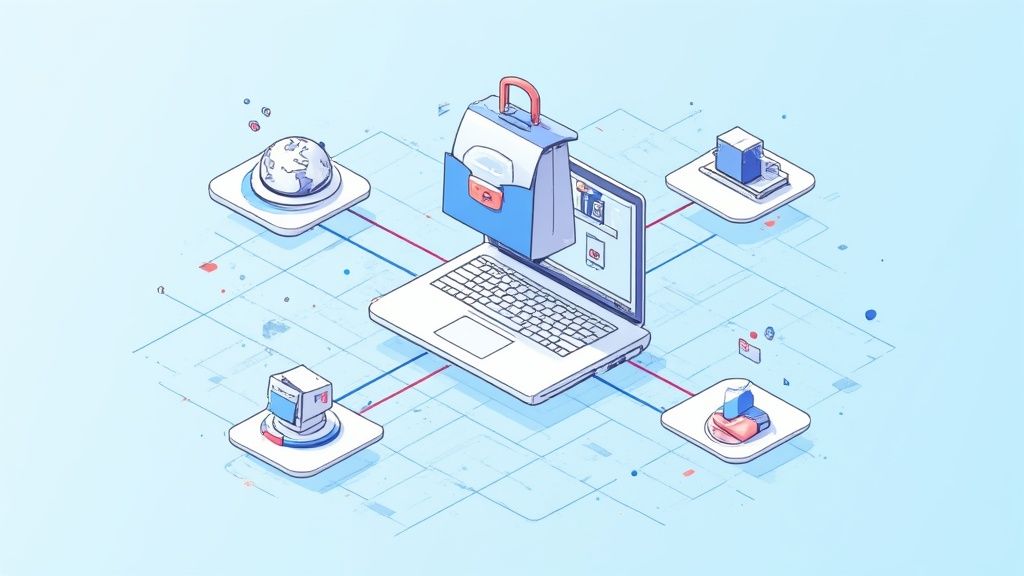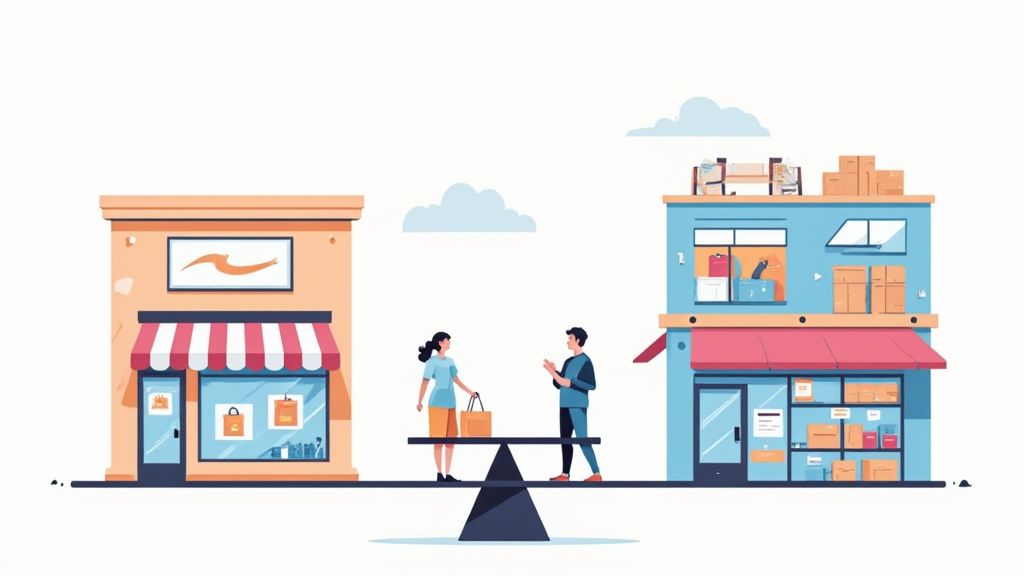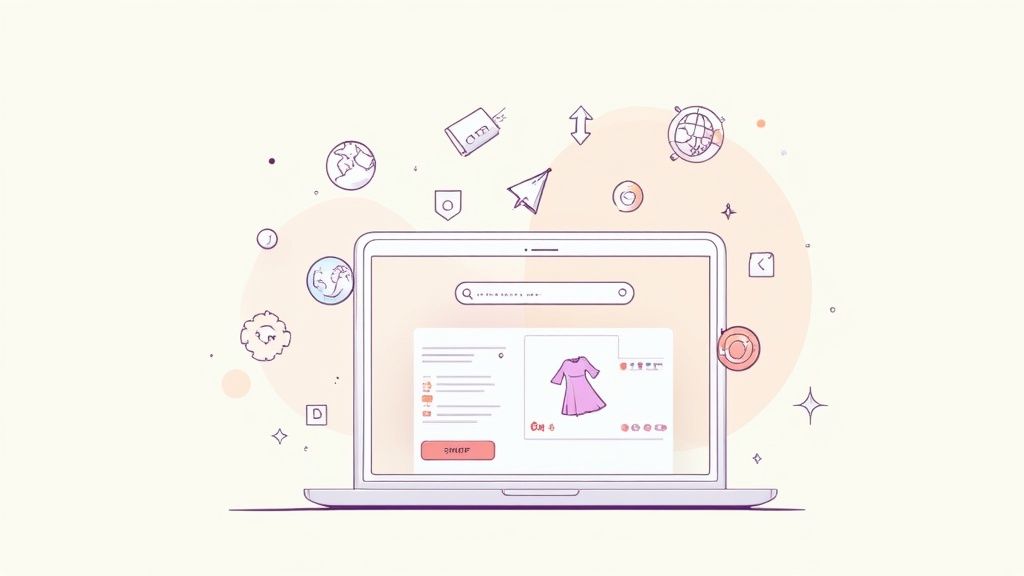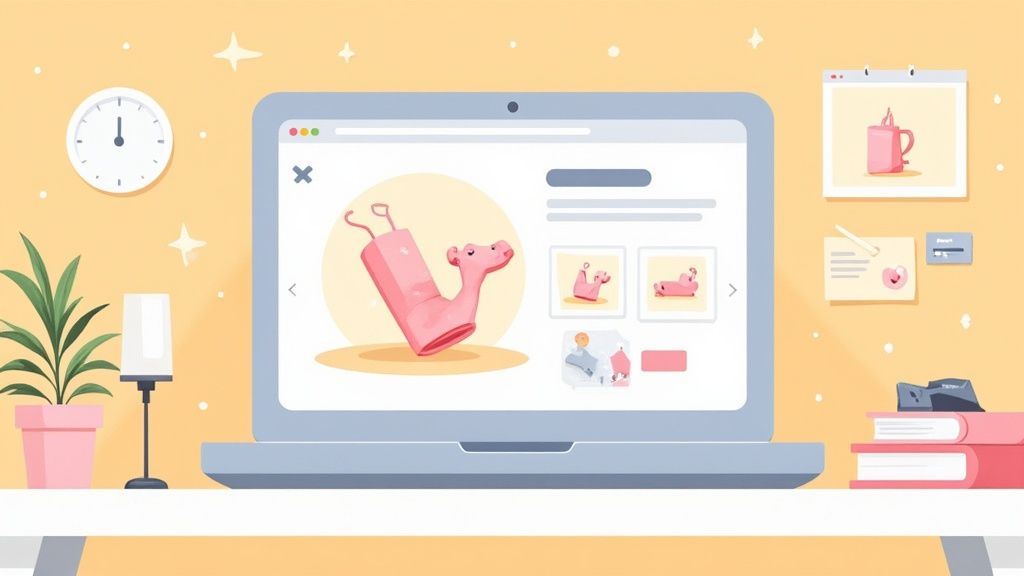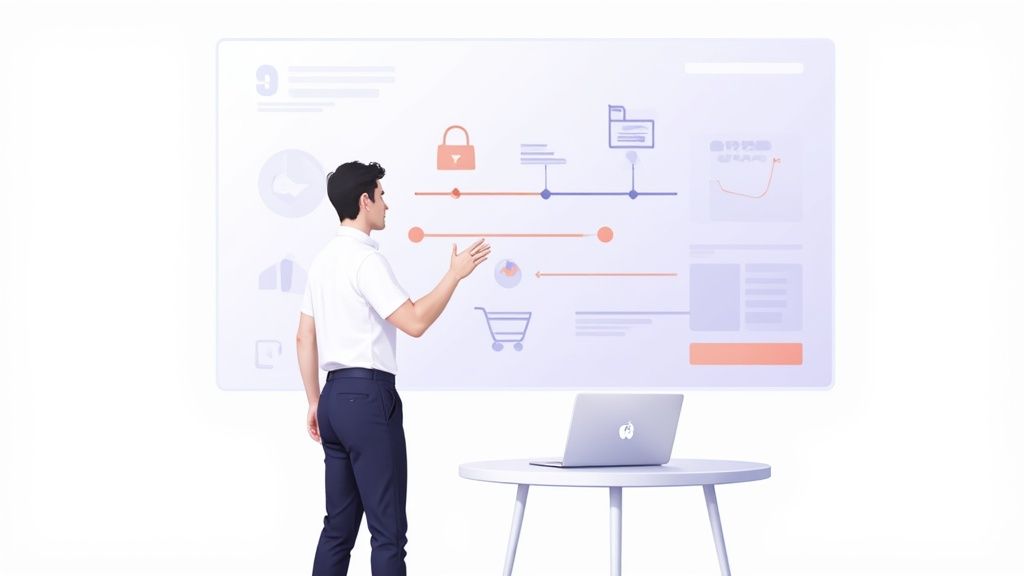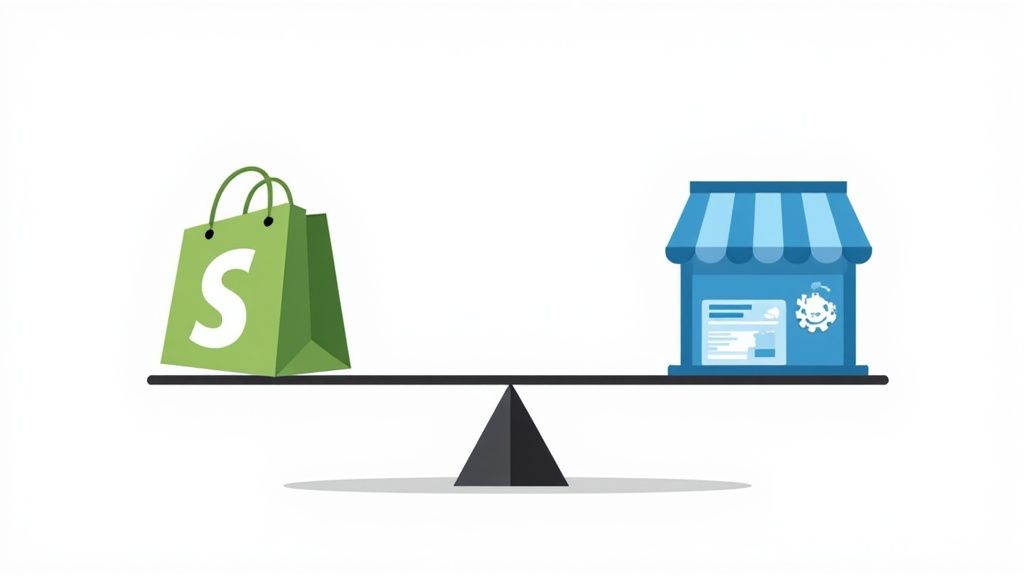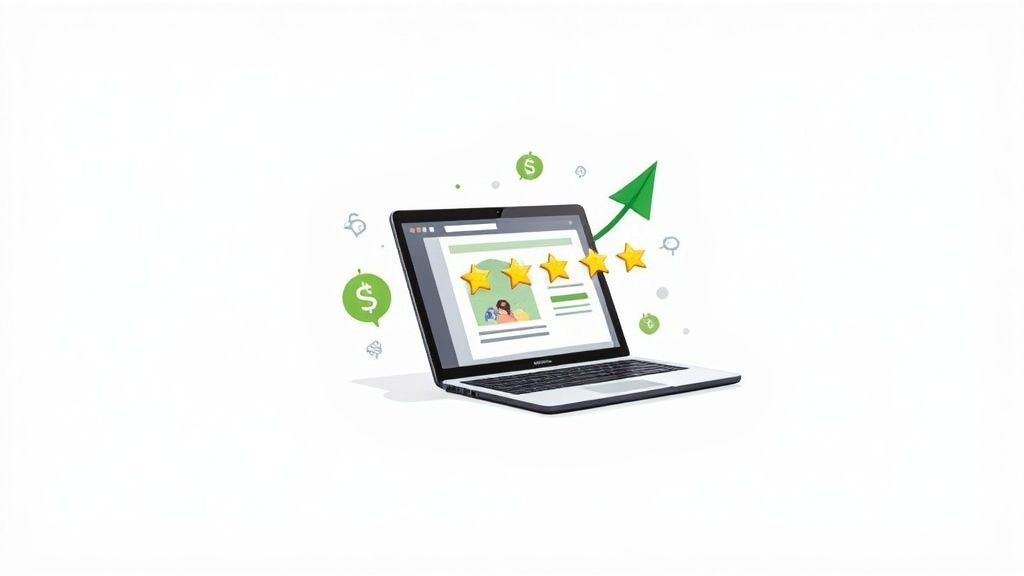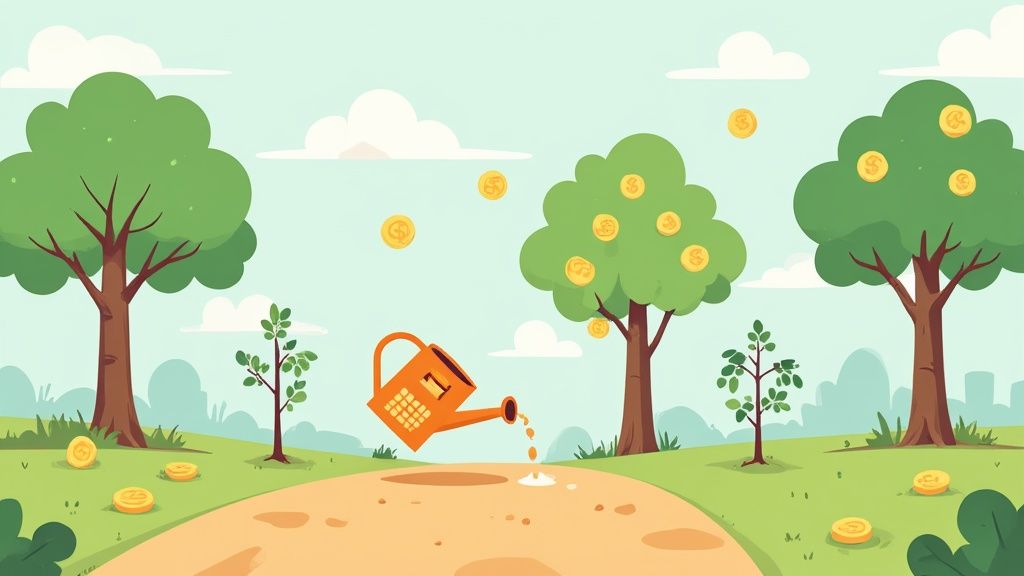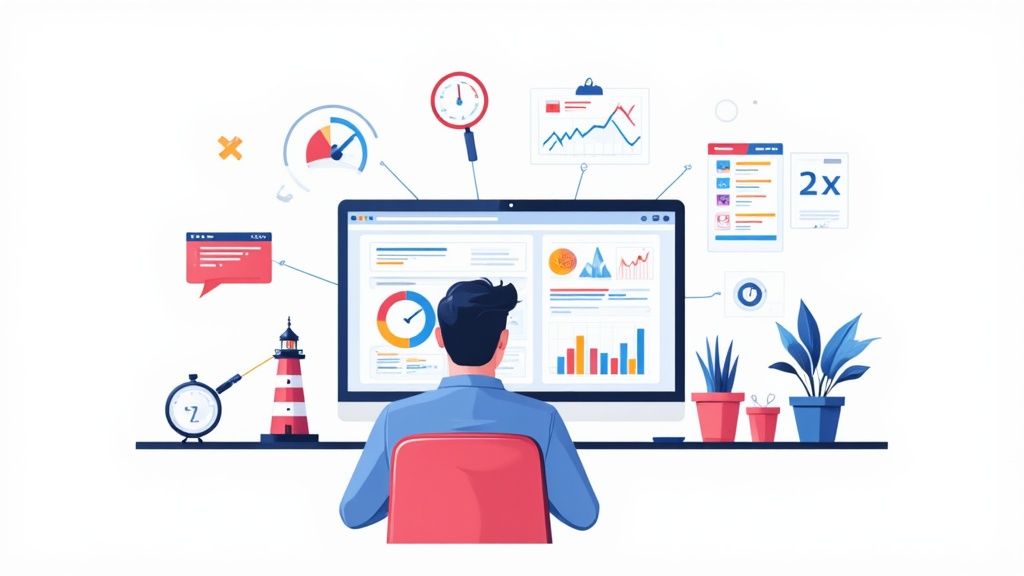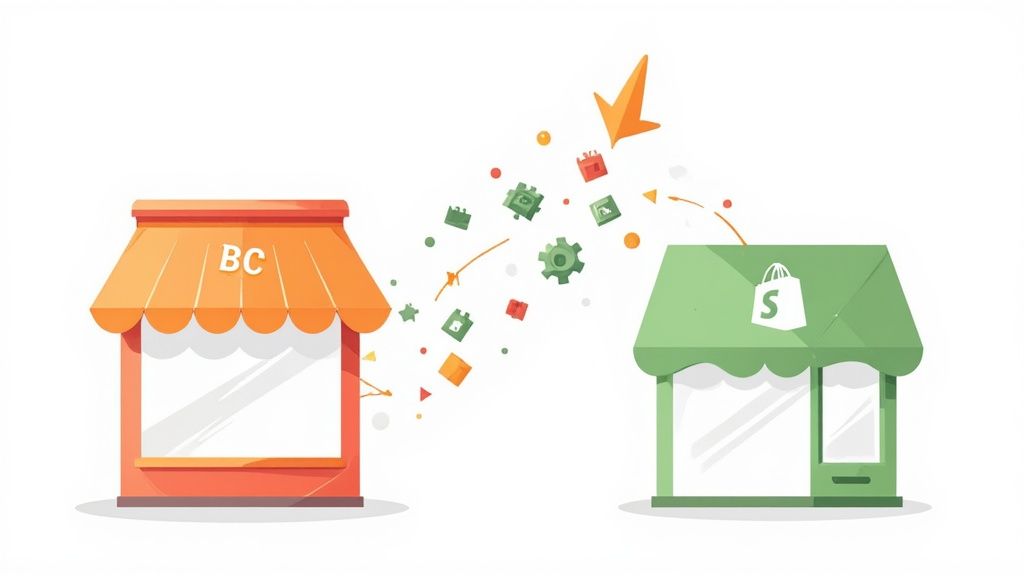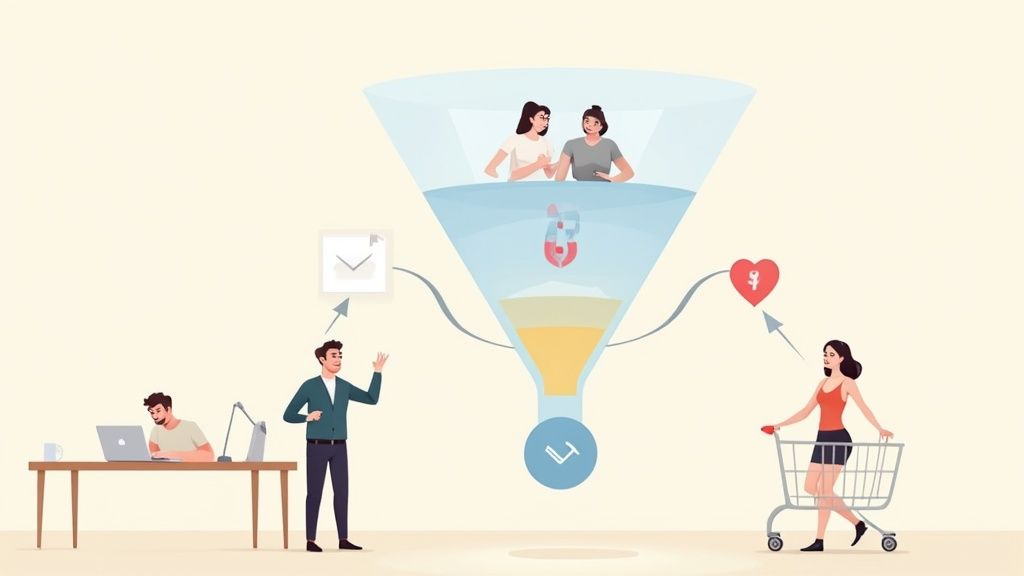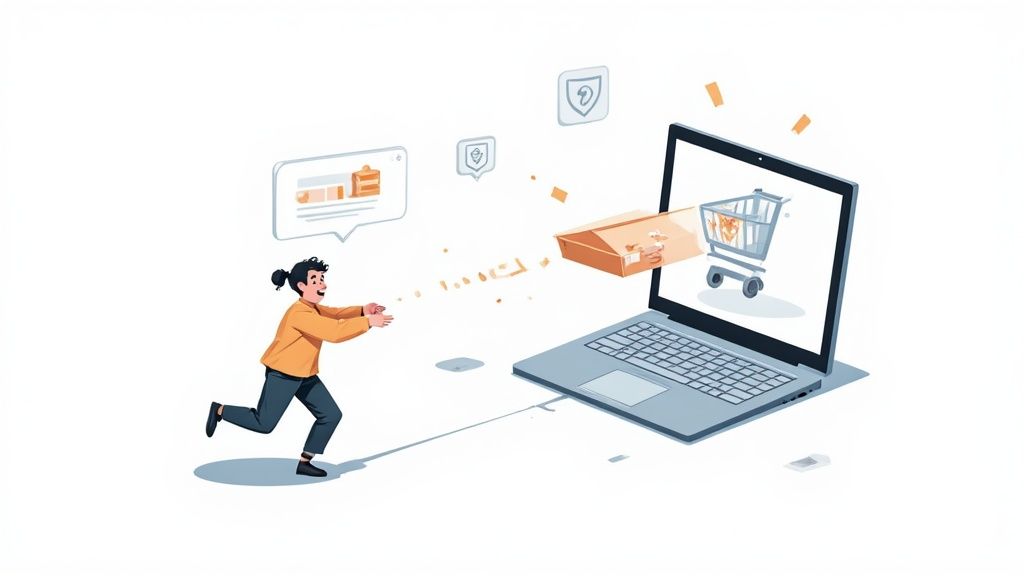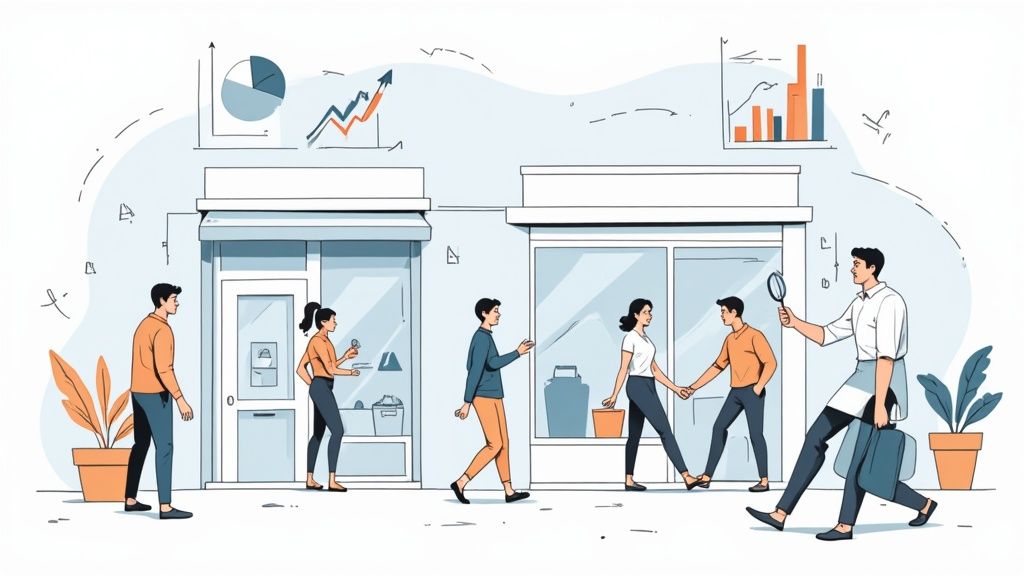
Think of your website like a physical store. You might have plenty of people walking in, browsing the aisles, and looking around. But if most of them leave without making a purchase, you have a problem. That's where conversion rate optimization (CRO) consulting comes in. It's the art and science of turning those "window shoppers" into actual, paying customers. It’s a disciplined, data-first approach where experts figure out what's stopping users from converting and fix it.
How CRO Consulting Unlocks Your Website's Potential
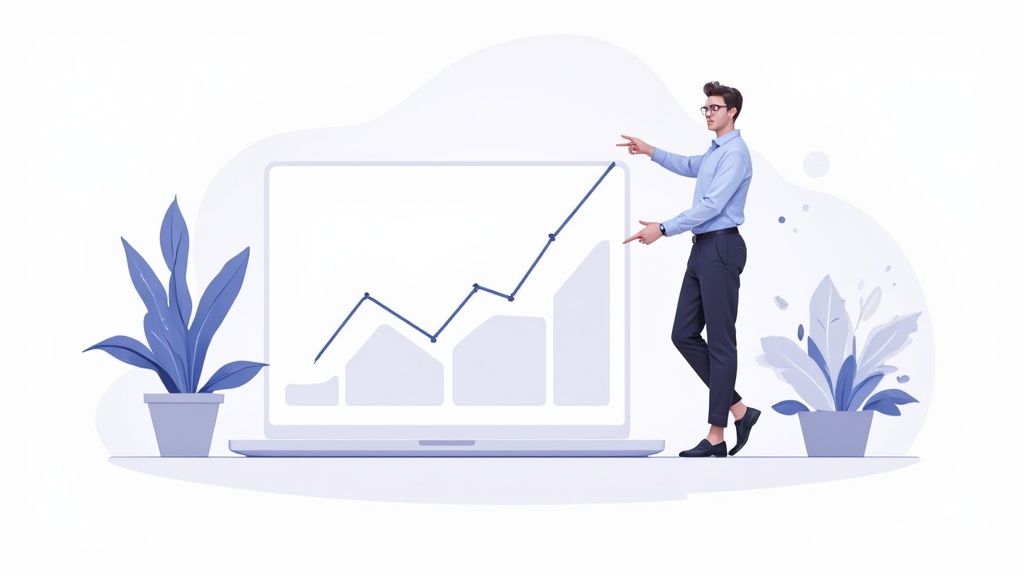
A common trap for businesses is thinking that the only path to growth is pouring more money into ads to get more traffic. While traffic is obviously important, it's only half the story. CRO consulting flips the script by focusing on getting more value from the traffic you already have. It's all about efficiency—squeezing more ROI out of your current marketing spend.
A great CRO consultant is like a growth architect for your digital presence. They don't operate on gut feelings, guesswork, or the latest design fad. Instead, they bring a methodical, almost scientific process to the table to genuinely understand user behavior and drive strategic improvements.
The Scientific Method of Growth
At its heart, professional CRO is a cycle of continuous improvement. It’s not just about randomly changing a button color and hoping for the best. A true consultant follows a structured process to ensure every change is backed by solid evidence, not just an opinion. This is what separates the pros from the amateurs.
The typical process involves several key stages, each building on the last to uncover insights and validate them with real-world data.
Here’s a look at what a typical CRO consulting engagement looks like, broken down into its core phases.
Core Components of a CRO Consulting Engagement
This structured approach ensures that every decision is deliberate and aimed at achieving measurable growth.
A common misconception is that CRO is just A/B testing. In reality, testing is the last step. The real magic happens in the research and analysis phases, where you uncover the "why" behind what your users are doing.
More Than Just A Higher Conversion Rate
Ultimately, the goal of CRO consulting isn't just about nudging a single metric upwards. It's about creating a fundamentally better user experience that fosters trust and loyalty. When you systematically remove friction and confusion, you make your website more intuitive, more helpful, and far more persuasive.
This is an investment that pays dividends across your entire business. By understanding what truly clicks with your customers, you can sharpen your marketing messages, improve your products, and build a more profitable, customer-focused operation from the ground up. For any business serious about sustainable online growth, it's a foundational strategy.
Why Invest in Professional CRO Services
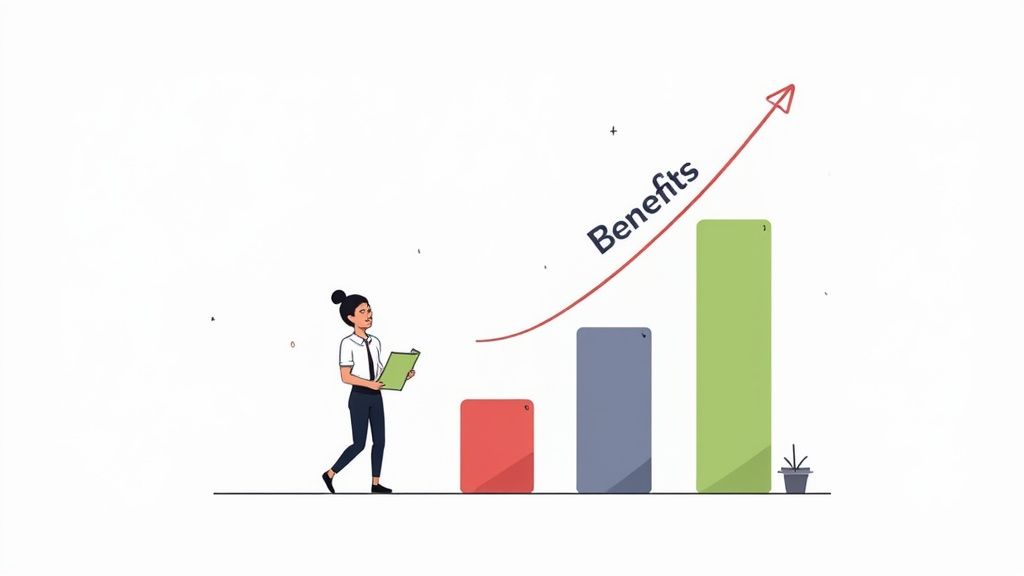
Many businesses get stuck on a simple growth formula: more traffic equals more sales. While it sounds right on the surface, this thinking has a critical flaw. Pouring more ad spend into a website that doesn't convert is like trying to fill a leaky bucket with a fire hose—you're spending a lot on the water, but most of it is just draining away.
This is where professional conversion rate optimization consulting comes in. It’s all about plugging those leaks. Instead of just chasing more visitors, a CRO expert focuses on getting more value from the people already on your site. It’s a strategic shift that turns your website from a passive brochure into an active, efficient sales engine.
The most obvious benefit is the direct impact on your return on investment (ROI). By methodically finding and fixing the things that stop users from converting, a consultant helps you generate more leads and sales from your existing budget. This immediately drives down your customer acquisition cost (CAC), making every marketing dollar you spend work much, much harder.
Beyond a Better Conversion Rate
While the name suggests a narrow focus on one metric, the true value of CRO consulting goes way beyond just bumping up your conversion percentage. The process creates a ripple effect that strengthens your entire business.
The deep user research that a consultant performs—digging into heatmaps, session recordings, and user feedback—is a goldmine of business intelligence. You don't just find out what users are doing; you finally understand why.
These insights are pure gold, informing and improving:
- Your Marketing Message: You'll discover which value propositions actually resonate with your audience. This helps you sharpen everything from ad copy and email campaigns to your social media content.
- Your SEO and PPC Efforts: Understanding user intent allows you to refine your keyword strategy and build landing pages that perfectly match what searchers are looking for. This can boost Quality Scores and improve organic rankings.
- Product Development: User feedback often highlights pain points or desired features, giving you a direct line into what your customers genuinely want from your products or services.
A CRO program doesn't just fix your website; it gives you a direct, unfiltered look into the mind of your customer. The learnings from a single A/B test can reshape an entire marketing campaign for the better.
Navigating the Digital Noise with Expert Guidance
In a world of shrinking attention spans and fierce competition, getting users to take action is tougher than it's ever been. This is where specialized conversion rate optimization consulting becomes a real competitive edge. Consultants bring advanced, data-driven strategies to the table to systematically eliminate friction in your sales funnel.
The investment, which for seasoned professionals typically lands between $5,000 to $15,000 per month, reflects the specialized skills needed to drive these kinds of results. For a deeper look at how agencies structure their pricing, you can check out more details on CRO agency costs.
Ultimately, hiring a CRO consultant is an investment in sustainable, intelligent growth. It builds a culture of making decisions based on data, not guesswork. This continuous loop of testing, learning, and improving ensures your business not only converts more visitors today but is also built to adapt and thrive tomorrow.
Inside the CRO Consultant's Playbook
So, what does a conversion rate optimization consulting expert actually do? It’s a lot more than just guesswork or randomly changing button colors. A true professional works from a systematic playbook—a methodical process that turns raw user behavior into actionable, data-driven insights. It's a continuous cycle of discovery, testing, and learning.
Think of a consultant as a detective showing up to investigate a crime scene. In this case, the "crime" is lost conversions. Their first move isn't to make accusations (or random site changes); it's to meticulously gather evidence. This initial research is the foundation for everything that comes next.
The Deep-Dive Research Phase
A consultant starts by immersing themselves in your data. The goal is to understand not just what users are doing, but why they're doing it. To get the full story, they combine two types of data:
- Quantitative Data (The "What"): This is all about the numbers. Using tools like Google Analytics, they'll analyze user flows, pinpoint pages with high drop-off rates, and segment audiences to see how different groups behave. They're on the hunt for statistical patterns that signal a problem.
- Qualitative Data (The "Why"): This is where the human element comes in. Consultants use tools like heatmaps to see where people click and scroll, session recordings to watch actual user journeys, and on-site surveys to just ask visitors about their experience. This context is what gives life to the numbers, revealing the frustration or confusion behind them.
The real magic of conversion rate optimization consulting isn't just in the tests they run. It's in the quality of the questions they ask during the research phase. A great consultant spends most of their time deeply understanding the problem before ever thinking about a solution.
Forming and Prioritizing Hypotheses
With all that evidence collected, the consultant can now form a data-backed hypothesis. This isn't a vague wish like, "let's make the page better." It's a specific, testable statement. For example: "If we replace the generic 'Submit' button on our lead form with specific text like 'Get Your Free Quote,' then more qualified users will complete the form because the new copy clarifies the value they'll receive."
But here's the thing—a good research phase might spark dozens of these ideas. You can't test them all at once. This brings us to the next critical step: prioritization. Using a framework, they'll score each test idea based on a few key factors:
- Potential Impact: How big of a lift could this change realistically create?
- Confidence: How strong is the data telling us this is a good idea?
- Ease of Implementation: How much time and effort will it take to build and launch this test?
This process ensures that the tests with the highest potential to move the needle for your business get tackled first. It's all about maximizing the ROI of the engagement.
The infographic below shows how this systematic flow works, moving from the initial audit and testing all the way to final optimization.
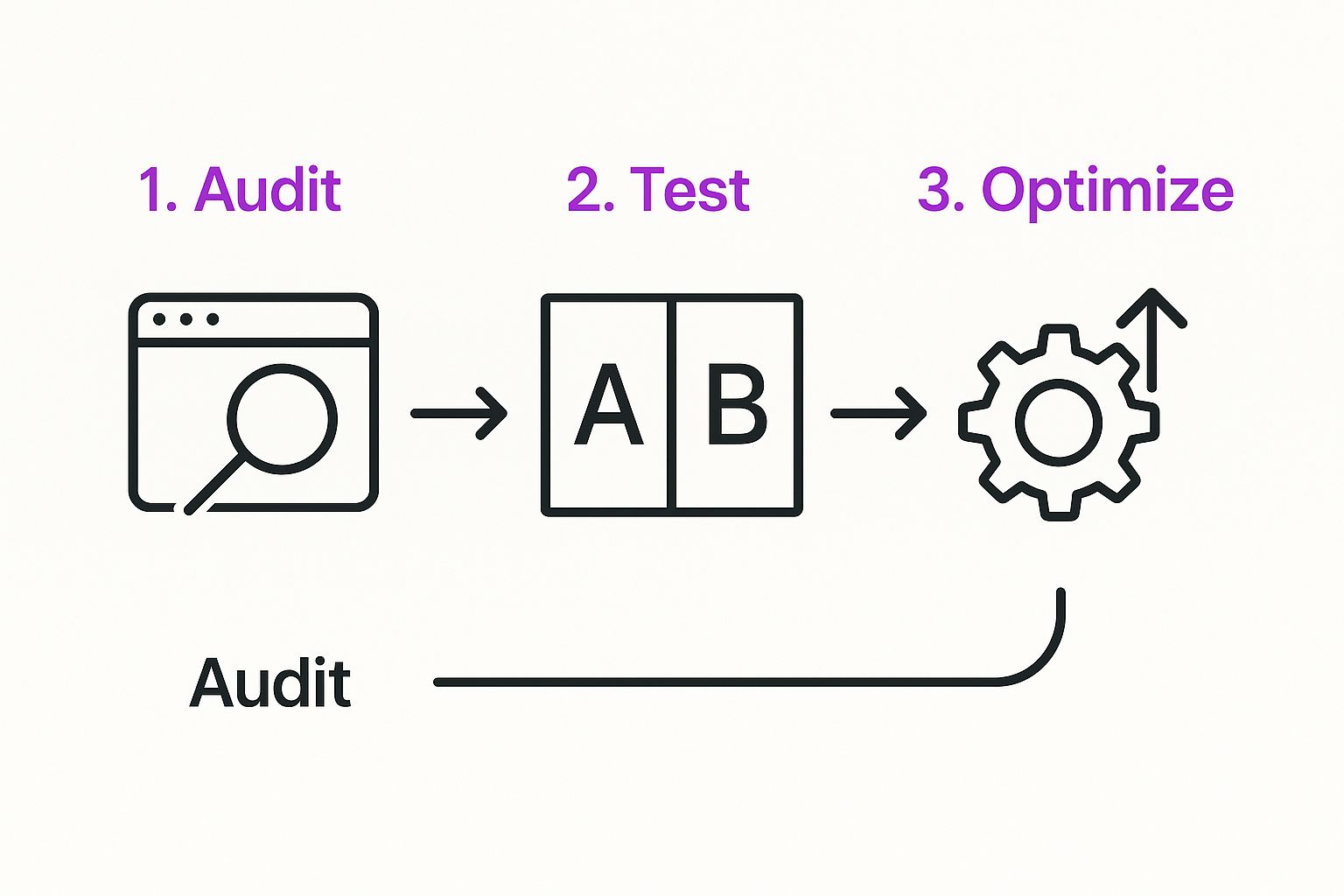
This structured approach moves you from broad analysis to specific, validated improvements, creating a powerful cycle of growth.
Running Structured Experiments
With a prioritized list of hypotheses ready to go, the consultant finally moves to the testing phase. The most common method here is the classic A/B test (or split test). A portion of your website traffic sees the original page (the "Control"), while another portion sees the new version (the "Variation"). A consultant's playbook will always include comprehensive conversion rate optimization strategies that are tailored to hit specific business goals.
For more complex changes, they might run a multivariate test, which can test multiple combinations of changes at the same time. On platforms like Shopify, knowing the specific ins and outs of testing is crucial. If you want to dive deeper, our guide on Shopify A/B testing explains how these experiments are applied in an e-commerce setting.
A test runs until it reaches statistical significance, which is just a fancy way of saying the results aren't a fluke. This scientific rigor is what separates professional CRO from just making changes and hoping for the best. A consultant makes sure every "win" is a real win.
Finally, they analyze the results. Whether a test wins, loses, or is inconclusive, there's always something to learn. A winning test gets implemented, but even a losing test provides valuable insight into what your users don't want. This feeds right back into the next round of hypotheses, powering a continuous loop of research, testing, and learning that drives sustainable growth.
How CRO Strategies Adapt to Your Industry
When it comes to conversion rate optimization, anyone peddling a one-size-fits-all checklist is doing you a disservice. A seasoned CRO consultant knows that the path from visitor to customer looks completely different from one industry to the next. The mindset of your audience, what they expect from you, and even what a "conversion" means in the first place all demand a custom-built strategy.
Think about it. The journey to buy a new pair of sneakers is worlds apart from the process of hiring a corporate lawyer. One is fast, visual, and often impulsive. The other is a high-stakes decision built on deep research, credibility, and trust. Slapping a generic optimization playbook on both would be a spectacular failure because it ignores the fundamental differences in why and how those customers buy.
Real conversion rate optimization consulting always starts with a deep dive into your specific industry. A good consultant doesn’t just look at your website; they analyze your competitors and, most importantly, get inside the head of your target audience.
E-commerce Versus Professional Services
Let's look at two common examples to see just how much these strategies can diverge. For an e-commerce shop, the name of the game is making the path to purchase as smooth and painless as possible.
- E-commerce Focus: The consultant’s playbook will zero in on things like streamlining the checkout flow, optimizing product pages with gorgeous images and crisp descriptions, and plastering social proof like customer reviews everywhere to build quick confidence. A major win here is slashing the cart abandonment rate.
- Professional Services Focus: For a B2B law firm or financial advisor, the goal isn't an instant sale—it's to generate a high-quality lead. The strategy pivots entirely to building authority and unwavering trust. Here, a consultant will focus on crafting powerful case studies, simplifying lead forms so they don't feel like a chore, and making sure every pixel of the site screams credibility.
Applying e-commerce tactics—like "limited-time offer!" pop-ups—to a serious professional services site is a classic blunder. It can instantly shatter the very credibility that business needs to land a discerning client. This single mistake perfectly illustrates why you need industry-specific expertise.
This distinction is everything. An e-commerce site might test button colors to nudge up "add-to-cart" clicks. A law firm might test the wording on its contact form to encourage more consultation requests. It's all optimization, but the context is king.
The Role of Data and Industry Benchmarks
A sharp consultant also brings industry-specific data to the table. This isn't about vanity metrics; it's about setting realistic goals and spotting where the real opportunities are. Conversion rates aren't the same everywhere—they swing wildly depending on the industry and where the traffic comes from.
For example, direct traffic (people typing your URL right into their browser) converts at an average of 3.3%. But that number jumps to over 4% in high-trust fields like healthcare, legal, and dental services. On the flip side, paid search ads average 3.2%, but the variance is huge: it can soar to 5.2% in finance but crater to below 2% for B2B tech and travel. Knowing these benchmarks helps a consultant pinpoint where you're leaving money on the table.
This data-first approach lets a consultant tailor their efforts for maximum impact. A B2B tech company with dismal ad conversions needs to work on its landing page message and offer. A healthcare provider, however, should be doubling down on trust signals and making appointment booking ridiculously simple to capture all that high-intent direct traffic.
Ultimately, the real value of expert conversion rate optimization consulting is this adaptive intelligence. It’s about moving beyond generic "best practices" to forge a strategy that’s a perfect fit for your industry, your audience, and your business goals—turning your unique visitors into your best customers.
Finding the Right CRO Consultant for Your Business
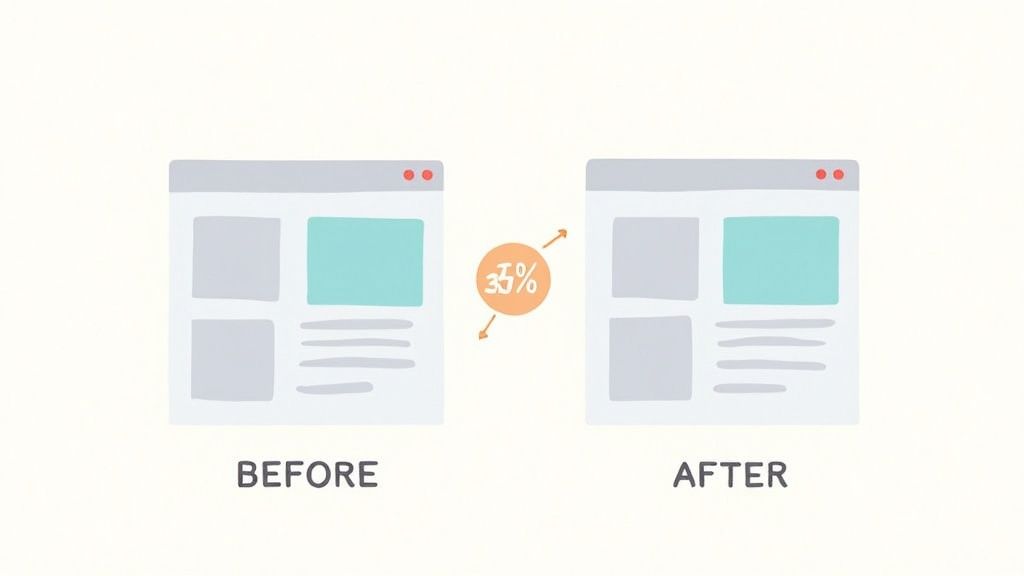
Choosing a partner for conversion rate optimization consulting is one of the biggest growth decisions you'll make. Get it right, and you’ll systematically unlock revenue you never knew you had, all from your existing website traffic. Get it wrong, and you could waste months and thousands of dollars on pointless tests and vanity metrics.
Think of it like hiring a specialist doctor for your company's financial health. You wouldn't pick a surgeon based on a flashy ad, would you? Of course not. You'd check their credentials, want to understand their process, and hear about real patient outcomes. The same logic applies here. Your goal is to find a transparent, strategic partner who’s as obsessed with your bottom line as you are.
This means you need a solid framework for vetting potential consultants. You have to learn how to spot a genuine, data-driven pro who follows a scientific method—not a slick salesperson promising quick fixes and guaranteed wins.
Essential Questions to Ask Every Potential Consultant
Before you even think about signing a contract, you need to put potential partners through their paces. Their answers (or lack thereof) will tell you everything you need to know about their experience, strategic thinking, and whether their style fits your business.
Here’s a checklist of non-negotiable questions that will cut through the fluff:
- "Can you walk me through your research and testing process from start to finish?" A real expert will spend most of their time talking about the research phase—analytics audits, user recordings, heatmaps, and surveys—long before they even mention A/B testing. If they jump straight to "we'll start testing your buttons," that's a huge red flag.
- "How do you decide which test ideas to run first?" "We just go with our gut" is not an acceptable answer. A pro will describe a clear prioritization framework, like the PIE (Potential, Importance, Ease) model, to explain how they focus on tests that deliver the most business value, not just the easiest ones.
- "What does a successful engagement look like to you, and how do you report on it?" Their answer needs to be about more than just "a higher conversion rate." A great partner will talk about statistical significance, the actual business impact (like revenue per visitor or lead quality), and sharing what they learned from both winning and losing tests.
- "Tell me about a time a test failed. What did you learn from it?" This one is a litmus test for honesty and a commitment to learning. Any consultant who claims they’ve never run a failing test is either brand new to the game or isn’t telling you the truth. Failure is part of the process; learning from it is what matters.
Understanding Common Pricing Models
Once you feel good about their process, the conversation will inevitably turn to money. Conversion rate optimization consulting fees are usually structured in a few different ways, and each has its own pros and cons for you.
A consultant's pricing model often reveals their philosophy. A structure based purely on performance might sound tempting, but it can incentivize a focus on short-term wins over sustainable, long-term growth.
Here are the three most common models you’ll come across:
- Monthly Retainer: This is the most popular structure for a reason. You pay a fixed fee each month for ongoing services, allowing the consultant to become a deeply embedded part of your team and truly understand your business goals for long-term, strategic work.
- Project-Based Fee: You pay one flat fee for a specific project with a clear end date, like a three-month audit and testing sprint. This can be a great way for businesses to dip their toes into CRO or solve a very specific problem on their site without a long-term commitment.
- Performance-Based Incentive: Here, the consultant's pay is directly tied to the results they produce, often as a percentage of the extra revenue they generate. While it sounds great because it aligns incentives, it can be tricky to track and sometimes leads to a focus on easy wins instead of critical, foundational improvements.
At the end of the day, picking the right consultant comes down to finding an expert who not only has the technical chops but also shows a real dedication to a transparent, data-driven process. They should feel less like a vendor and more like a strategic extension of your team, focused on delivering real business value—not just numbers on a dashboard.
The True Impact of CRO on Business Strategy
A lot of businesses see conversion rate optimization as a finishing touch—just a few tweaks to the website after the "real" work is done. It's a common mistake, and it completely misses the big picture. When done right, conversion rate optimization consulting isn't just another marketing tactic; it's a powerful business intelligence engine that can fuel your entire strategy.
Think of your CRO efforts as an always-on focus group. Every A/B test, every heatmap, and every user survey is a direct line into your customer's brain. You finally stop guessing what they’re doing and start to understand why. That's where the magic really happens.
From Website Data to Company-Wide Insights
The insights you pull from a solid optimization program don't just stay on the website. They create a ripple effect that touches every part of your business. This isn't just about figuring out which button color gets more clicks; it’s about uncovering fundamental truths about your audience that should absolutely inform major business decisions.
Here’s how that CRO data turns into a strategic powerhouse:
- Refining Your Product Roadmap: User feedback from surveys and session recordings is pure gold for your product team. It shines a light on friction points or features customers are clamoring for, helping your team prioritize what to build next.
- Sharpening Core Marketing Messages: When you test different headlines and value propositions, you're not just optimizing a single page. You're learning the exact language that makes your audience tick. Those proven messages should then be woven into everything—your ads, your emails, even your sales scripts—to create a brand story that’s both consistent and compelling.
- Shaping the Customer Experience: By pinpointing where users get stuck or frustrated on your site, you’re basically creating a map of their pain points. This helps you build a more supportive and intuitive customer journey that extends far beyond that first conversion.
CRO isn’t just about plugging a leaky sales funnel. It’s about getting inside the heads of your buyers so you can build a better, more customer-focused business from the ground up. It’s what makes you truly competitive.
The Untapped Potential in the Market
The strategic power of CRO is obvious, yet it's shocking how many businesses still haven't committed to a formal process. The global e-commerce conversion rate lingers around a meager 3.76%. And while most B2B marketers agree CRO is critical, a staggering 68% of small businesses still don't have a documented strategy.
This is a massive gap in the market, highlighting a huge opportunity for growth that most companies are simply leaving on the table. You can dive deeper into these global CRO adoption statistics to see just how much potential is out there.
At the end of the day, putting money into conversion rate optimization consulting is an investment in a smarter, more nimble business. For e-commerce brands, this cycle of continuous improvement is absolutely essential. Our full guide on Shopify conversion rate optimization breaks down specific strategies that can turn your store into a far more effective selling machine. It’s how you set yourself up to not only convert today's traffic but to build the kind of lasting customer relationships that drive growth for years to come.
Of course. Here is the rewritten section, formatted to match the provided examples and written in a natural, expert human voice.
Your CRO Consulting Questions, Answered
If you're digging into conversion rate optimization, you probably have a lot of questions. That’s a good thing. Whether you're thinking about bringing in a consultant or just trying to get a handle on the process, getting straight answers is key. Let's clear up some of the most common questions we hear.
We'll tackle everything from how long it really takes to see results to whether this is just for the e-commerce giants.
How Long Does It Take to See Results?
Everyone wants to know this, and it’s a fair question. While we'd all love instant wins, a proper CRO program isn't a magic wand—it's a long-term strategy. You might get a boost from some "quick win" adjustments in a few weeks, but the real, data-backed results from A/B testing usually start to show up within 2-3 months.
Why so long? A good consultant needs that time to dive deep into your data, come up with smart hypotheses, and run tests that are actually statistically significant. The goal of conversion rate optimization consulting isn't a temporary spike; it's about building sustainable growth that keeps compounding over time.
Think of it like a fitness program. You might feel better after one week, but real, lasting transformation takes months of consistent, disciplined effort. CRO works the same way, building strength and efficiency over time.
Is CRO Only for Big E-commerce Sites?
Absolutely not. This is one of the biggest misconceptions out there. CRO is a powerful tool for any business with a website that needs to do a job. E-commerce is the classic example, sure, but the core ideas work anywhere you have traffic and a goal.
If you have a website and want users to take a specific action, you can benefit from CRO. This includes:
- B2B Companies trying to get more qualified leads through a form.
- SaaS Businesses that want to increase free trial sign-ups.
- Publishers looking to grow their newsletter or paid subscriber list.
- Local Service Providers who need to book more appointments online.
What Is the Difference Between SEO and CRO?
This is a fantastic and very common question. The easiest way to wrap your head around it is with a simple brick-and-mortar store analogy.
- SEO (Search Engine Optimization) is your marketing and signage. It's everything you do to get more people to walk through the front door of your store.
- CRO (Conversion Rate Optimization) is your in-store experience. It’s about making sure the layout, displays, and checkout process are so smooth that more of those visitors actually buy something.
They're two sides of the same growth coin. SEO brings in the potential customers, and CRO turns that potential into actual revenue. A smart digital strategy needs both working together.
Ready to turn more of your visitors into customers? ECORN specializes in data-driven CRO strategies that deliver measurable results for Shopify brands. Discover how our expertise can accelerate your growth.






